
A Gift from the Heart July 2023 | saltmagazine.org.nz Plant Life Getting to know Number 22 Recalibrating Belief Spotlight on Alcohol Harm
4 Prayer Focus on Yemen
David Youngmeyer highlights the humanitarian crisis in Yemen.
8 Plant Life
Captains Faye and Steve Molen take us on a journey through the life and mission of Manurewa Corps Plant.
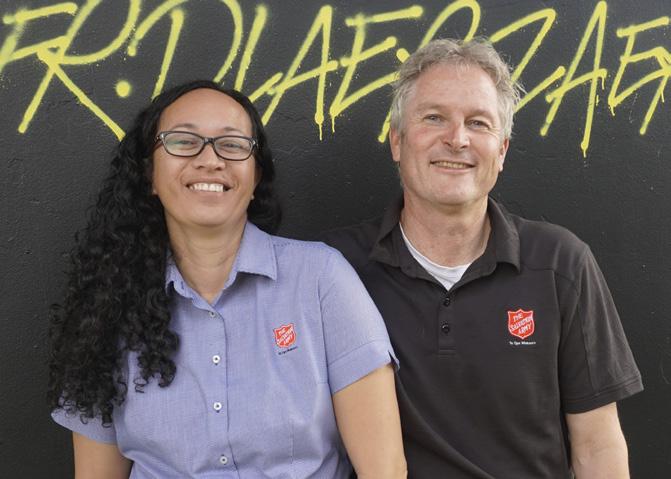
12 LAB Students’ Legacy
The Salvation Army Youth Apprenticeship Programme explained.
18 The Greatest Commandment
Kāpiti Corps' Georgia Braun discusses her journey from teenage atheist to Christian social worker.
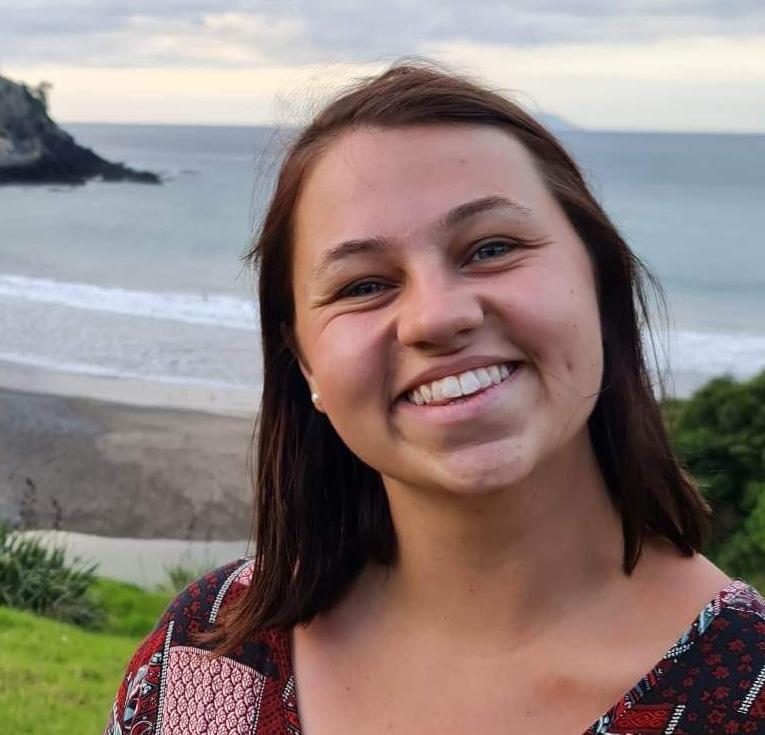
24 Welcome Home
Guest writer Kelly Cooper writes about the prodigal son, floppy hankies and a God who welcomes us home.
26 Recalibrating Belief
Lieutenant Jonny Whybrow discusses the ‘Wesleyan Quadrilateral’ for navigating belief.
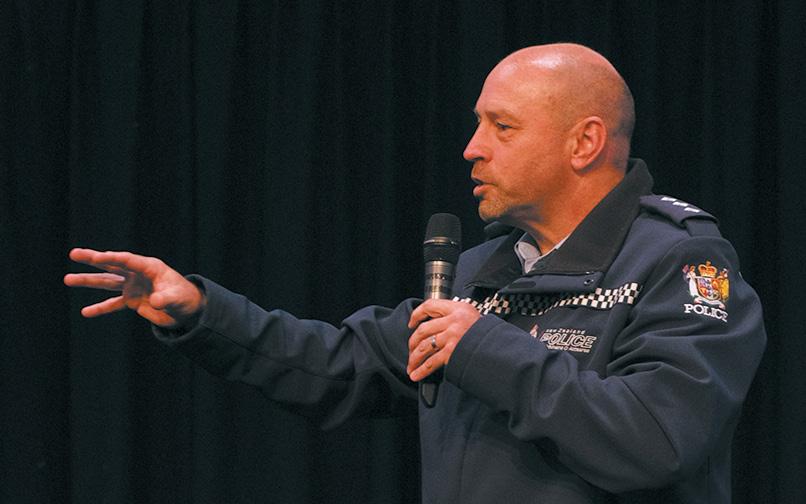
31 Territorial Welcome for Indonesian Officers
Introducing Lt-Colonels Alberth and Elsi Sarimin to the territory.
SALT Magazine
The Salvation Army New Zealand, Fiji, Tonga and Samoa Territory
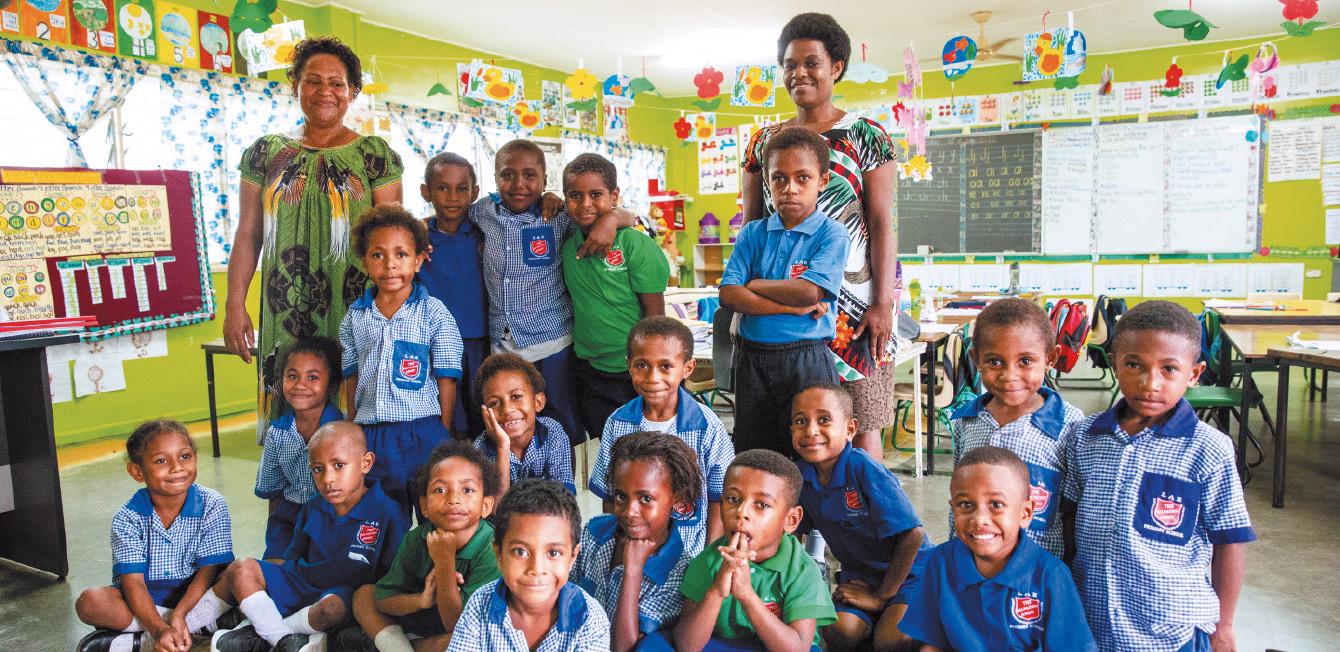

Territorial Leaders
Commissioners Julie and Mark Campbell
General
Brian Peddle
Founders
Catherine and William Booth
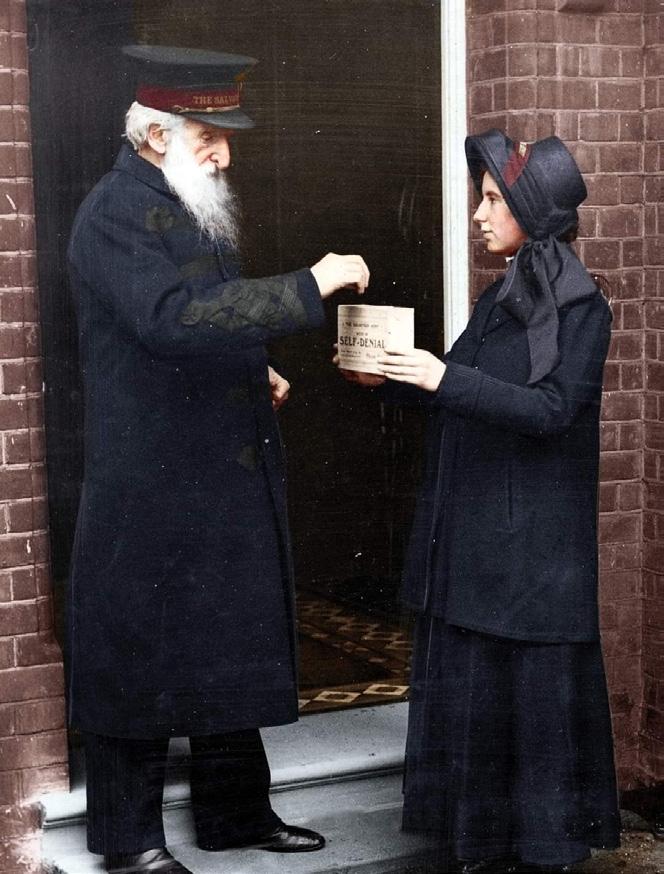
Editor
Vivienne Hill
Graphic design
Sam Coates, Nicole Gesmundo, Lauren Millington
Staff writers
Jules Badger, Captain Rachel Montgomery, David Youngmeyer
Proof reading
Major Glenys Fairhurst, Colleen Marshall
Connect with us saltmagazine.org.nz
SalvationArmyNZFTS @SalvationArmyNZ salvationarmynzfts
Territorial Headquarters, 204 Cuba Street, PO Box 6015, Marion Square, Wellington 6141 p: (04) 384 5649
e: salt@salvationarmy.org.nz
All Bible references from the Holy Bible, New International Version, unless otherwise stated.
Views and opinions expressed do not necessarily represent those of The Salvation Army.
Articles are copyrighted to The Salvation Army, except where indicated, and may be reprinted only with permission.
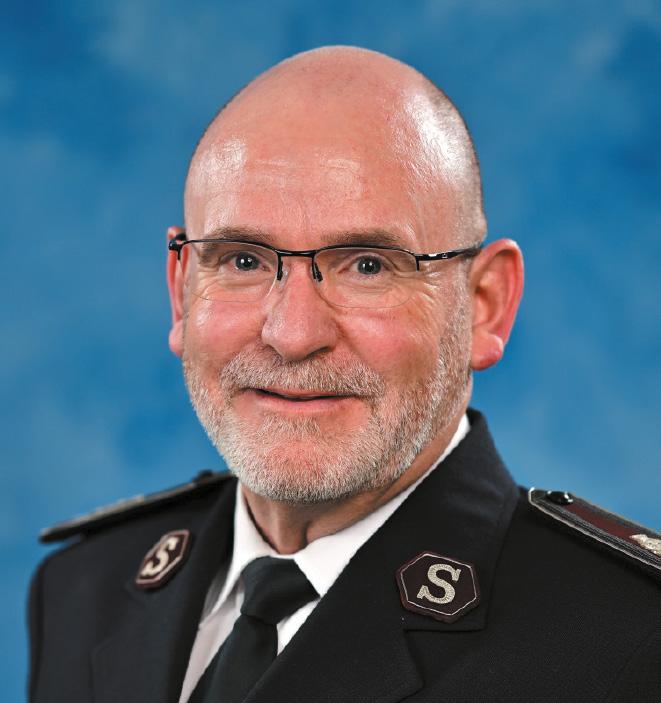
17 19 29 33 09 07 21
Publishing for 140 years Volume 3, Issue 3 ISSN 2816-1351 (Print) ISSN 2816-136X (Online)
Subscriptions mailorder@salvationarmy.org.nz Print Management MakeReady
2 July 2023
Contents
Orientation of Generous Lives
he theme of this edition of SALT is generosity. A dictionary definition of the word ‘generosity’ is ‘freedom from meanness or smallness of mind or character’.
The spirit of generosity is often manifested in people who are free with their time, their encouragement, their emotional availability and their goods and money. Generosity is more than just an intention; it is about the orientation of a life.
There is no recipe for developing generosity, no list of dos or don’ts, but there is a mindset that looks for opportunities to be generous and this will be a good starting point towards a future outworking of generosity.
Our first feature on page 8 is a great example of lives oriented towards generosity. Captains Faye and Steve Molen have purposefully decided to share their lives with their community in Manurewa, Auckland. Their willingness to be open and available to their community is testament to ministry oriented towards generosity.
The big enemy of generosity is fear—fear of lack, fear of scarcity, fear of missing out, fear of not being enough or having enough. Often this fear comes from past experiences that have fed fear. Lack, in particular, sucks generosity
out of a person’s life, as it triggers fear and promises scarcity.
The antidote for fear is Jesus Christ. His promises to us of supplying our needs, his care and unconditional love give us the security we need to navigate the darkest of days. But he calls us to live our lives with an open hand and an open heart.
Over the next six weeks, Salvation Army congregations will be encouraged to deny themselves in order to give to those who are not as fortunate as we may be. Your gifts will enable people from other countries who do not have access to the benefits of medical care, education, food and water as readily as we do. You can read about the appeal on pages 20–23 and 33. We will also include a link for our readers to watch the videos, participate with the children’s Self Denial programme and read the family devotional.
Bless you as you too consider how you might generously give to this wonderful opportunity to change people’s lives and communities for the better.
Vivienne Hill Editor
saltmagazine.org.nz 3
No one ever has become poor by giving. ANNE FRANK
INTERNATIONAL PRAYER
• Algeria—Pray for the unity and strength of Christians in Algeria as they face increasing persecution. Pray for provision for Christian families, particularly those who are converts from Islam as they face the greatest dangers and social and governmental sanctions.
• Sudan—Pray for Christians in Sudan at this time of political unrest. Pray for opportunities for them to work and participate in society. Pray for the protection of Christian females who are often forced into marriages and enslaved because of their faith.
• Mozambique—Pray for Christians who have been internally displaced due to persecution. Pray protection for Christians from the drug cartels who target them, particularly their youth.
• Cuba—Pray for church leaders who are being targeted by the communist government and also harassed and monitored by the state security agency. Pray for Christians who are being persecuted through abductions, surveillance, arrests, fines and abuse.
• North Korea—Continue to pray for North Korea, the most dangerous country in the world to be a Christian. The underground church in North Korea faces extreme persecution and, if exposed, whole families are imprisoned for long periods of time and face brutal torture.
SALVATION ARMY PRAYER
Please keep those impacted by Cyclone Gabrielle in your prayers. We continue to pray for the Kingdom of Tonga rebuilding after the eruption; Christchurch North Corps; Territorial Commercial Department; Territorial Communications Section; Community Ministries Centres throughout the territory; Territorial Corps Growth and Development Department; Court Services in Central, Northern and Fiji Divisions; The Salvation Army in Mozambique and The Salvation Army in the Netherlands, Czech Republic and Slovakia.
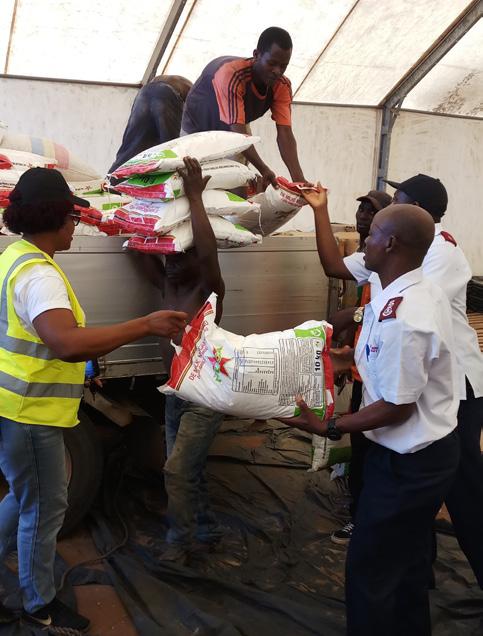
Prayer Focus: Yemen
Two-thirds of Yemen’s population, or around 21.6 million people, need humanitarian assistance and protection services, according to the United Nations. The prolonged conflict, economic collapse and frequent natural disasters such as floods have contributed to one of the world’s major complex emergencies. Some 17 million people are estimated to face food insecurity, with 3.5 million acutely malnourished—many of them children. Around 4.5 million people are displaced inside the country. In this context, vaccine-preventable diseases such as polio, measles, diphtheria and whooping cough have all been spreading. More than 22,000 measles cases were recorded last year, including 161 deaths. After years of conflict, the country is contaminated with millions of landmines and explosive remnants of war. These deadly carryovers of conflict resulted in 121 civilian casualties in the first three months of 2023 alone. A shortfall in aid donations has left humanitarian organisations struggling to meet the huge need.

4 July 2023
Readers familiar with Picoult’s work know to expect a book that elegantly navigates controversial human experiences. And while Mad Honey certainly meets that brief, it is a book Picoult certainly couldn’t have written on her own—not with integrity and authenticity. An award-winning author in her own right, Finney Boylan’s contribution is crucial. The story is so cleverly and exquisitely woven that I found myself halfway through the book before I realised the true delicacy of the narrative content (which I won’t give away here). Overall, I was challenged and educated and deeply moved. Mad Honey is a must-read for the 21st century.

(Reviewed by Jules
Badger)
What’s On?
Peter Pan & Wendy
PG, Fantasy, Adventure | Directed by David Lowery | Watch on Disney+

In a time when films seem to be squeezing as much ‘action’ as possible into their run-times, David Lowery’s Peter Pan & Wendy is refreshing in how the pacing feels like a family adventure movie from the 80s or 90s. There’s space for characterisation to be explored, rather than relegated to an afterthought. A particular highlight is the performance of Ever Anderson as Wendy, who holds the majority of the narrative perspective. Combining the slightly hammy overexuberance of villains written for children with an unexpectedly poignant (and touching) message of forgiveness, this is a more-than-worthy retelling of the classic coming-of-age story.
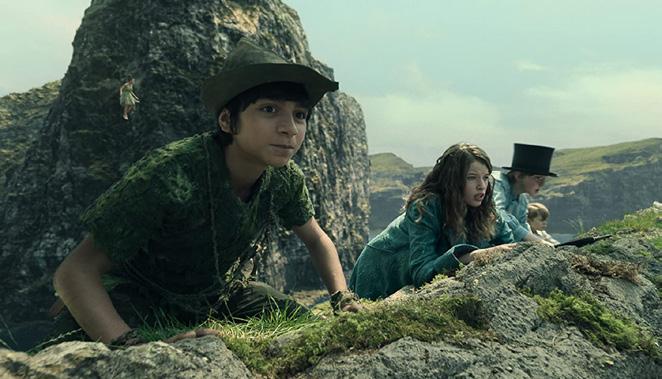
(Reviewed by Sam Coates)
American Born Chinese (ABC)
G, Adventure, Fantasy | Created by Kelvin Yu | Available on Disney+
An American Chinese teenager navigating questions of identity, finds himself in a mythological battle when a mysterious new Chinese boy arrives at his high school. Adapted from the graphic novel of the same name by Gene Luen Yang, American Born Chinese is unapologetic in its use of Chinese folklore, referencing the classic 16th century novel, Journey to the West, and expecting unfamiliar audiences to learn as they watch. It highlights the uncomfortable ‘otherness’ that main character Jin experiences, as teachers get his name wrong and pair him up with new Chinese student Wei-Chen because they ‘have so much in common’. The fantastical elements of this show are impressive (the fight scenes!) and beautiful (the costumes!), but the interpersonal highs and lows are what make this show shine.
(Reviewed by Holly Morton-Chong)
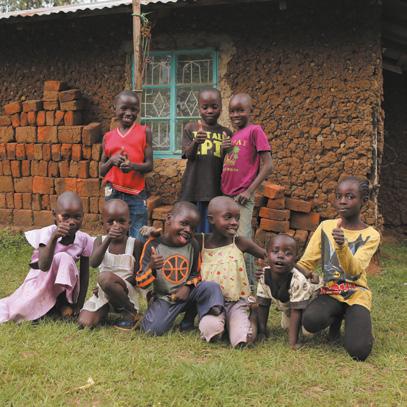
 Mad Honey
Novel | Jodi Picoult and Jennifer Finney Boylan
Mad Honey
Novel | Jodi Picoult and Jennifer Finney Boylan
BMAC Winter Peak (Odyssey)
July Matariki (Māori New Year) 14 July Self Denial Appeal 16 July – 20 August Save the Date Thought Matters Conference 29 September –1 October Fiji Division 50th Anniversary 15–17 December Check out our full event calendar at saltmagazine. co.nz/events
3–9
Courage does not always roar. Sometimes courage is a quiet voice at the end of the day saying, “I will try again tomorrow”.
saltmagazine.org.nz 5
MARY ANNE RADMACHER
INTRIGUING INDEX
The eyes have it
1 Amazing processors
Eyes can process 36,000 pieces of information in an hour. Over the span of an average life, the eye will see around 24 million images.
2 Colour of the eyes
Only two percent of the population have green eyes. Babies are born with either brown or blue eyes, and it can take from six months to three years for green eyes to develop.
3 Age-related tears
Babies do not produce tears until they are around six weeks old, and adults produce fewer tears as they age.
4 Screen strain
People generally read 25 percent slower on screen than on paper. When you read or stare at a computer, you blink less often resulting in tired eyes.
5 Fastest muscle in the body
The eye contains the fastest muscle in the body, the orbicularis oculi, which contracts in less than 1/100th of a second, making it also the most active muscle in the body.

Do You Know These People?
If you recognise any of the people in this photo, we’d love to hear from you.
Email: archives@ salvationarmy.org.nz
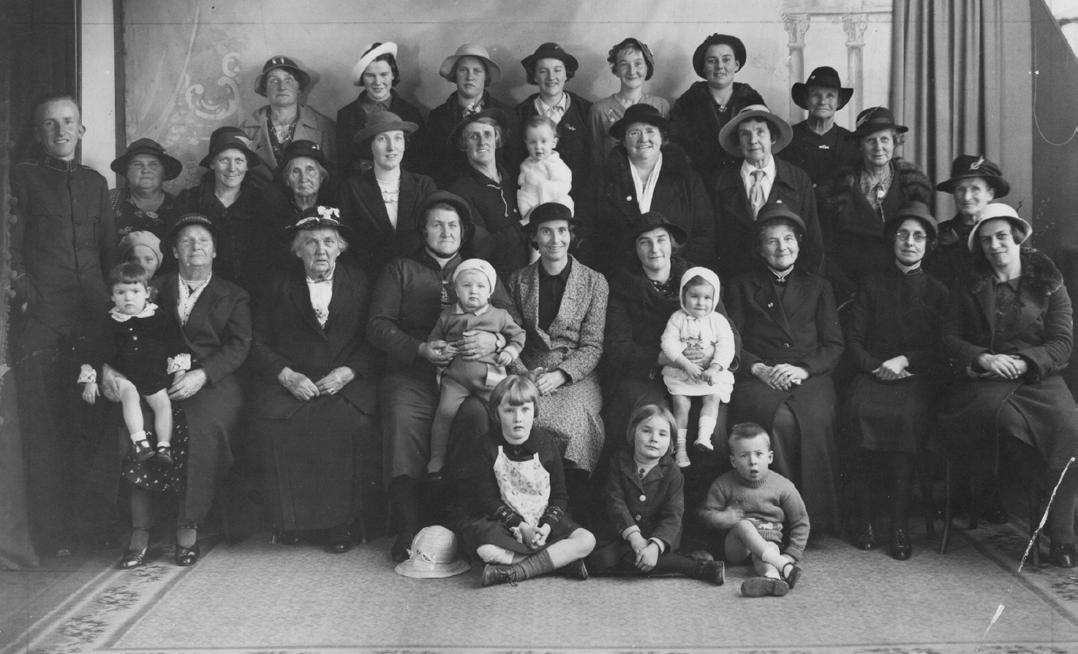
QUICK QUIZ
1 Who invented the jigsaw puzzle?
2 What type of rock are New Zealand’s Southern Alps predominantly made of?
3 What day is World Ocean Day?
4 How many eyelids do dogs have?
5 When was French artist Henri Matisse born?
Answers page 32
 Source: Please Don’t Pray With Your Mouth Full , by Bob Swanson.
Source: Please Don’t Pray With Your Mouth Full , by Bob Swanson.
6 July 2023
Mexican Spiced Tomato Soup (aka Mexican Lentil Soup)

This dish is a serious fan favourite, sometimes referred to as Mexican Lentil Soup. It’s filling, nourishing and really savoury. Red lentils are a good source of protein, iron and fibre and contain no fat; they also cook quickly, giving this soup a thick, satisfying, hearty character in a relatively short time. It’s good with some sort of cheesy bread or scone for dunking. 50 mins | Serves 4–6 as a meal with cheesy scones for dunking
Ingredients
• 2 Tbsp olive oil
• 2 onions, chopped
• 3 cloves garlic, crushed
• 3 tsp Mexican seasoning (see next column)
• 2 400g cans chopped tomatoes
• 1½ cups uncooked red lentils, rinsed
• 6 cups of beef stock—allow 1 heaped tsp of stock powder per cup of water
Method
• ⅓ cup tomato paste
• 2 Tbsp brown sugar
• ½ cup of chopped fresh coriander or parsley
• Sour cream to serve (optional)
Mexican seasoning
• 1 heaped Tbsp ground cumin
• 2 tsp sugar
• 1 tsp oregano
• 1 tsp salt
• 1 Tbsp ground chilli
In a large saucepan heat the oil, add the onion and garlic and cook until soft. Stir in the Mexican seasoning, tomatoes, lentils, stock and tomato paste, and bring to a simmer.
Stir in the sugar and simmer, stirring from time to time, for 45 minutes, till the soup is thick and lentils are tender.
Serve topped with a dollop of sour cream and a sprinkle of fresh herbs.
To make Mexican seasoning: Measure ingredients into an airtight container or jar, shake well and store with your spices.
Tip: To make this vegetarian, swap the beef stock for vegetable stock and add a dash of soy sauce or a spoonful of Miso for a hit of umami savoury flavour.
Source: Sophie Grey | destitutegourmet.com
Feed Hearts. Feed Minds. Feed Families.
Launching on 10 July, this year’s New Zealand Winter Appeal will raise funds to provide not only nourishing meals, but also give practical and spiritual support this winter—feeding hearts, minds and families. Food is at the heart of whānau (family), and often it is also the start of the Army’s relationships with people in need. But feeding empty stomachs is just one of the many services provided, and by providing wraparound support, people can get back on their feet for good.
You can support the appeal at salvationarmy.org.nz/WinterAppeal
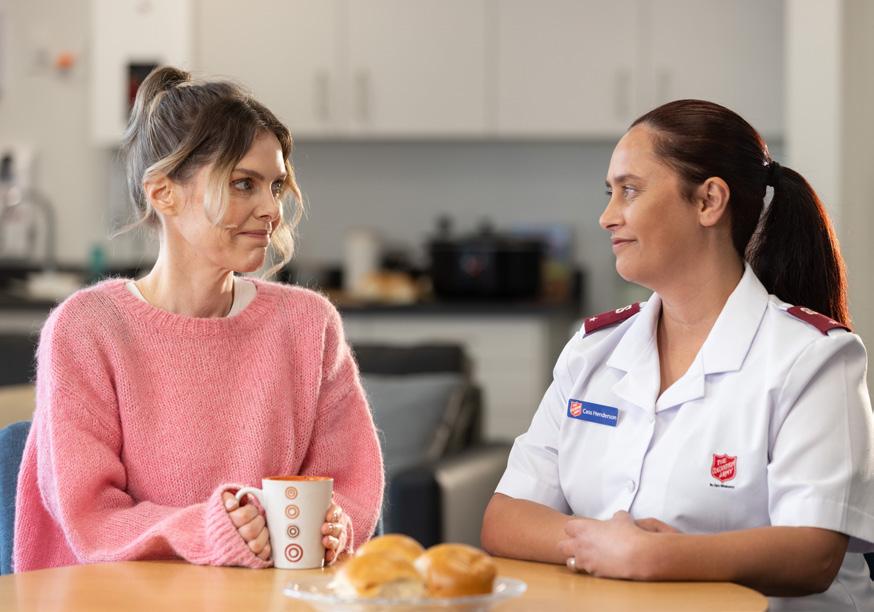
WORD OF THE MONTH
Playwright
(English, noun) a person who writes plays.
Source: Oxford English Dictionary
saltmagazine.org.nz 7
Plant Life
Nurturing the seeds lovingly planted by previous officers, Captains Faye and Steve Molen are now in their sixth year as leaders of The Salvation Army Manurewa Corps (Church) Plant in South Auckland. With roots now strong and deep within the community, the couple are not only loving plant life, but the mission of The Salvation Army in Manurewa is blooming.
WORDS Jules Badger
aptains Faye and Steve Molen are passionate and intentional people. With a background in youth work, the couple are renowned for serving the mission of The Salvation Army in creative and innovative ways. Their approach to the appointment they currently find themselves in is no different.
Originally named Clendon Corps Plant, Faye and Steve took their lead from the local marae, with an official name change to the more expansive Manurewa soon after their arrival in 2018.
‘The name was really important,’ explains Faye (Ngā Puhi/Ngāti Awa/Ngai Tūhoe). ‘We followed the same line of thought as Manurewa Marae. Everyone who lives in the area belongs there and so we wanted the corps name to reflect that. We [The Salvation Army] belong to all of Manurewa, not just a small part.’
Vibrant and beautiful
Faye and Steve feel very much at home in Manurewa. ‘It’s a good place to live and we love it,’ says Faye. However, she also adds that the media does Manurewa no favours.
‘Not everything you see on the news is accurate or true. For me, Manurewa is a vibrant place. There are many different cultures and ethnicities reflected in our community and in our church family too. There are a lot of families—big families—with generations living in the same area. There’s a lot of life and action in Manurewa.’
Statistically, Manurewa is categorised as a low socio-economic area with high unemployment. Where there is employment, wages are low, but the rent is high. Domestic violence is an issue, and there is a prevalence of sole parent households.
‘We very much want people to know that Manurewa is vibrant and beautiful, but at the same time there are social issues and there is dysfunction—some generational, others are systemic—making Manurewa the perfect place for The Salvation Army to be,’ affirms Steve.
‘People here still have the same hopes and aspirations for their own whānau as anywhere else,’ says Faye. ‘They want better for their kids and for themselves, but they struggle to get ahead because there are so many factors against them. There can be this feeling
8 July 2023
At first glance, church at Manurewa appears typical, but a commitment to building spiritual confidence in people means that when it comes to the message, the gift of collective revelation is given.
of helplessness because there are all these things that are outside people’s control that affect and impact them heavily. People are trying to navigate their way through housing needs while at the same time not having enough income to cover the basics. These external factors cause family stress that is sometimes hard for people to manage in a positive way, because it’s consistently coming at them. But this is why it’s the perfect place for us to be. We are not exempt from some of those things so we can show an alternative way of coping. We can support one another and hopefully offer another way of living.’
Blended ecology
Over the years Faye and Steve’s ministry philosophy has morphed into something new and exciting. When they first arrived, the priority was getting to know the community, setting up some appropriate programmes and consolidating a Sunday expression. But Steve notes that as time passed, releasing people to set up missional expressions birthed from their passions out in the community became just as important.

‘You get this blended ecology of multiple missional expressions where the corps and those missional expressions all benefit from one another,’ explains Steve. ‘And then this hub of excitement is created.’
Steve uses expansive phrases like beautiful synergy, evolving community and creative expressions to describe some of what is emerging in Manurewa. ‘They might stand alone with their own sense of belonging, discipleship and community or be linked back into the corps, but both support and live off each other in this beautiful blend of ecology. What you find is that when people are released into their passions and excited about planting new expressions in their own community then there is this vibrant life that happens between the two quite naturally. We don’t have to control everything.’
‘What we do in the community is never in competition with church,’ says Faye. ‘For us they sit together naturally and neatly.’
Manurewa Corps Plant is cleverly funded, with both Domino’s Pizza and Country Fried Chicken renting space out the front of the multi-purpose building on Roscommon Road.
This space also houses one of two
saltmagazine.org.nz 9
Above: Captains Faye and Steve Molen at the Manurewa Corps Plant facility.
Family Stores (the other in South Mall), Kiwi Kai Co-op headquarters (with three more community led co-ops recently set up), as well as office space and a kitchen/ dining room for shared meals.
Awhina Mai (Positive Lifestyle Programme) is a flourishing facet of corps life, as are various creative community expressions like Kaha Wahine Kotahitanga (strong women in unity). Group leader Te Rena Goodwin was recently interviewed by Women’s Ministries and you can hear her inspiring story on the Disturbance Podcast (women.salvationarmy.org.nz/ disturbance-podcast, episode 11).
Faye and Steve are quick to acknowledge not only the collaborative support of their leadership team, but also the encouragement they’ve received from Salvation Army leadership. ‘We’ve always been empowered by leadership,’ affirms Steve. ‘We love our Army and being here has been so freeing,’ says Faye. ‘We can try new things, but we do also calculate the risks before we do anything. We make sure what we are trying is meaningful and intentional—we’re not just trialling random things.’

Collective revelation
One of those experiments is Manurewa’s Sunday format. A multi-purpose facility means that church is held in the onsite Family Store, with couches and coffee tables being the furniture of choice. At first glance, church at Manurewa appears typical, but a commitment to building spiritual confidence in people means that when it comes to the message, the gift of collective revelation is given. ‘We use Discovery Bible which is based on the premise that everyone carries revelation from the Holy Spirit, not just the person preaching from the front,’ explains Steve. The priesthood of all believers is alive and well in Manurewa.
‘For us as facilitators, we present some of the context and background to those things that are hard for us to wrap our heads around in 2023, but then it’s discussed and the questions that are asked and answered apply to what’s happening in people’s real lives today,’ says Faye. ‘This builds confidence in our people because they know they are in a safe place to share and that what they have to say is as important as anyone else as we go on this spiritual journey together.’
10 July 2023
Above: Kara Mirvic (Manurewa Corps Plant member and Kiwi Co-op Facilitator, left) with Captain Steve Molen.
Collateral beauty
Faye and Steve describe their time in Manurewa as a season of surrender. Prompted by the Holy Spirit and with the support of divisional leadership, they rented out the officers’ residence provided by The Salvation Army and moved into a rental property in Randwick Park.
‘Initially I thought it was a ridiculous idea,’ admits Steve. ‘But the more we thought and prayed about it, the more we sensed that this was something God was calling us into.’
Now members of UNOH (Urban Neighbours of Hope), the couple are apprentices of incarnational living. Faye and Steve are supported and guided by experienced UNOH members who gather every week in a rhythm of prayer, training and friendship.

‘We can be so programme-based in The Salvation Army,’ says Steve. ‘So, we’re not starting from this place of we are here to do this for you, but instead there’s this reciprocal exchange of relationship and generosity that thrives within the context of being neighbours.’
‘God is still the God of hope,’ says Faye. ‘And he lives in our neighbourhood. There’s a lot of brokenness but that’s why Jesus came, and we can help by partnering with him. We can help soothe some of that brokenness and support people as they come through life’s challenges.’
Planting passion
Faye and Steve don’t think what they are doing is any better than any of the other amazing initiatives around the territory—it’s just what they believe is right for The Salvation Army in Manurewa in this season. Both are passionate about the mission of The Salvation Army, and the strong sense of calling they both have as officers to share the love of Christ.
‘For me there is this beautiful synergy of life and connection that wasn’t there before. Yes, some of our neighbours are living in hardship. Some nights bottles are smashed on the street and loud music plays at all hours. People fight in the street and police cars turn up. It’s chaos sometimes, but there’s also collateral beauty because we get to connect in the mix of all that and be present with people. We know their stories. There might be someone creating chaos on the street but often we know who they are and why they are reacting in that way because we know the family and the backstory. It’s been life changing for us,’ explains Steve.
‘We get to be part of the community as neighbours first, and not necessarily as the officers. There is a different level of relationship with people. I wander down to the dairy and we are visible, present and accessible,’ says Faye. ‘The wins look different, too. If our neighbours come into our home and make their own cup of tea, that’s a win; and if we go to their place and they let us in without feeling ashamed that we are there, that’s a win.’
‘We carry something of the Army’s prophetic calling to walk as the caring feet of Jesus amongst the lost and the broken,’ says Steve. ‘But we all carry something inside of us—a passion planted by Jesus. It’s planted in the heart and the attitude. Everyone has it, and we all need to be released to live out that passion—especially if it means trying new things, because when it’s something that Jesus has planted inside us, it needs to be encouraged to grow.’
Below: Worship in the Family Store space of the Manurewa Corps Plant facility.
saltmagazine.org.nz 11
‘There’s a lot of brokenness but that’s why Jesus came, and we can help by partnering with him.’
LAB Legacy Locked In
SALT
talks with National Director of Youth Missions Training Major Mat Badger and Youth Missions Programme
Coordinator Annika McLeod to get the lowdown on The Salvation Army’s LAB (Living And Breathing) Youth Work Apprenticeship. A decade on from its launch, not only is LAB producing well-trained and qualified youth workers, but a clear legacy is emerging.
Recipients of Salvation Army youth work in schools, corps (churches) and communities are coming of age and choosing youth work as their vocational calling. The three-year LAB Youth Work Apprenticeship becomes the next obvious step for some young people inspired by local youth workers who are graduates of the programme. But wait there’s more—some of those same students not only go on to become experienced youth workers, but also take up the challenge of leading as LAB facilitators. Mat’s one of the founding developers of the LAB programme and is excited but not surprised by this emerging legacy.
‘One of the basic premises of classic youth work practice is consistency. The foundation of youth work is longterm consistent relationships through the ups and downs of the turbulent teenage years,’ explains Mat.
Local LAB legend
‘Jon Riki from Roskill South, Auckland, is a great example of someone committed long term to his local community. Jon’s been doing youth work for 10 years in Roskill South and is now one of our LAB facilitators,’ says Mat. ‘He loves his community and knows personally the difference consistent youth workers make in the lives of young people. A
local graffiti artist even painted Jon as a local legend—how cool is that?! Jon believes in the LAB programme and this year four of our six LAB students are learning from him. Jon is a local legend and a LAB legend!’
The mission of the LAB Youth Work Apprenticeship is to prepare and strengthen youth workers to carry out faith-centred, evidence-informed, best practice, ethical and relevant youth work . It’s a full-time, three-year commitment that involves studying towards an approved qualification while based at a Salvation Army LAB site, with on-the-job training and mentoring from a LAB facilitator.
in a safe, consistent environment with a supportive facilitator.’

‘The reason for the LAB site is that any student of youth work is required to connect into an agency to do their practical work,’ explains Mat. ‘As The Salvation Army, we make the commitment to provide apprentices with a place to do their practical work
After identifying a good practitioner of youth work who has the capacity to train someone else, the LAB facilitators are entrusted with apprentices. ‘It’s the classic Jesus model,’ says Mat. ‘Year one is watch what I do, year two is let’s work together, followed by year three which is you do the work, and we’ll debrief together. There’s always an action-reflection process throughout the whole apprenticeship because we want to set students up to succeed.’
Quality qualification
In terms of formal study, the standard apprenticeship track involves two years’ Praxis training, with year three negotiated with the student based on
‘Although youth work is hard, the feeling you get when you see young people thrive and get to know our God makes everything worth it.’
Local legend Jon Riki, by a Mt Roskill graffiti artist. Quote adapted from J Cole (‘Losing My Balance’).
12 July 2023
their strengths or special interests. For some, those initial two years are cross credited to the Bachelor of Youth Development, while others may begin theological study through Laidlaw College. Either way, students come out with a solid qualification recognised across the sector, and quality practical LAB training that sets them up for success.
Mat adds that some students have uniquely tailored individual plans depending on their prior study and experience. Increasingly, students are coming with higher levels of education. ‘We used to have most students applying straight from school or shortly after, but we are starting to see students in their mid- to late-20s hook into the LAB programme. This year we have a
Thinking about youth work as a vocation?
We’re looking for people interested in becoming Salvation Army youth workers who are committed and passionate disciples of Jesus. Applicants are expected to have some experience of youth work practice, along with endorsement from their corps officer/centre manager and divisional youth secretary/regional youth officer. For more information go to www.firezone.co.nz
Real world youth work
Mat and Annika describe youth work as exciting, challenging, heartbreaking, heartwarming, bittersweet, miraculous, tedious, exhausting, fulfilling, rewarding and spiritually formational. A past LAB student herself, with a Bachelor of Youth Development, Annika pulls no punches when it comes to the reality of youth work.
student who already has a Bachelor of Ministry and a Bachelor of Youth Development, so we fast-tracked her to year three of the LAB apprenticeship. She is doing practical training under the LAB facilitator alongside a specific personal development year, which includes additional courses like the 12-Step Programme.’
‘Youth work is hard! You will be challenged in every way. So be ready. Be ready to see God. Be ready to wonder where the heck God is, but then have to say sorry later because looking back you can clearly see God in it all. Although youth work is hard, the feeling you get when you see young people thrive and get to know our God makes everything worth it. And that’s the constant reminder of the ‘why’ of youth work.’
Legend!

saltmagazine.org.nz 13
‘The foundation of youth work is longterm consistent relationships through the ups and downs of the turbulent teenage years.’
Rest, Restoration and Resilience
What do you think of when people talk about the three Rs? Perhaps you thought of the 2022 Indian language movie, RRR. Or maybe it was the three Rs of learning: Reading, Writing and Arithmetic. (Still not quite sure how they are all R words, but that’s for another day!)
Lately, I’ve been thinking of three other R words: Rest, Restoration and Resilience. In May I was privileged to attend a Salvation Army directed spiritual retreat held in the Wairarapa. The theme for the week was Behold, shifting our gaze to God based on Psalm 105:4. We each were encouraged to slow down, to rest, yes, even sleep if that was what was needed, and to reconnect with God.
Rest is so important for our wellbeing, our relationship with ourselves, others and with God. In Matthew 11:28, Jesus says, ‘Come to me, all who are weary and burdened, and I will give you rest’. Although stopping and resting is good, more is needed for there to be restoration of our wairua (spirit). At the retreat, as well as rest, we reflected on God’s Word, practised a variety of spiritual disciplines, had extended times of silence and had the opportunity to journey with an experienced spiritual director. Those who attended testified to the strong sense of restoration, answers to prayers and deeper relationships with God.
The third R is resilience. Matt Bloom in his article, ‘Flourishing in Ministry: Clergy, Ministry Life and Wellbeing’, writes ‘Resilience is the capacity to respond to challenges and the capacity to grow and learn from those challenges at the same time’. In a world that is fast-paced and ever-changing, our wellbeing is crucial. One way I have discovered to build resilience is to remember the acronym PENS: Pleasure, Exercise, Nutrition, Sleep. Have you done something this week that brings you pleasure? Have you exercised and eaten well this week? And are you getting enough sleep?
How are you doing in the areas of rest, restoration and resilience?
Lt-Colonel Liz Gainsford Territorial Secretary for Spiritual Life Development
Matthew 11: 28–30
Come to me, all you who are weary and burdened, and I will give you rest. Take my yoke upon you and learn from me, for I am gentle and humble in heart, and you will find rest for your souls. For my yoke is easy and my burden is light. (NIV)
Haere mai ki ahau, e koutou katoa e māuiui ana, e taimaha ana, ā, māku koutou e whakaokioki. Tangohia tāku ioka ki runga ki a koutou, kia whakaakona koutou e ahau; he ngākau māhaki hoki tōku, he ngākau pāpaku: ā, e whiwhi koutou ki te okiokinga mō ō koutou wairua. He ngāwari hoki tāku ioka, he māmā tāku pīkaunga. (PT)
Dou lako mai vei au, koi kemudou vakaaduaga sa oca ka colata nai colacola bibi, ia kau na vakacegui kemudou. Vakataqara vei kemudou na noqu i vua, ka vuli vei au, niu sa yalomalua ka yalomalumalumu: dou na kunea kina na vakacegu ni yalomudou. Ni sa rawarawa na noqu i vua, ka mamada na noqu i colacola. (FOV)
Agar tum bojha ḍhote ḍhote thak gaya hei to hamaar lage aao, ham tumme araam dega. Hamaar juaaṭha (yoke) aapan uppar uṭhaao aur ham se seekho, kaahe ke ham naram dil ke aur deen hei, aur tumme araam mili. I juaaṭha ḍhoy meñ sahaj hei, aur bojha bhi halluk hei. (FRHNT)
Ha‘u kiate au, ‘a kimoutolu kotoa pe ‘oku fakaongosia mo māfasia, pea te u fakamālōlō kimoutolu. ‘Ai ‘eku ioke kiate kimoutolu, pea mou ako ‘iate au: he ‘oku ou fa‘a kataki mo angafākatu‘a, pea te mou ‘ilo ha mālōlō ‘i homou laumalie. He ko e ioke a‘aku ‘oku molū, pea ko e kavenga a‘aku ‘oku ma‘ama‘a. (TMB)
Ia outou o mai ia te au, o outou uma o e tigaina ma mafatia i avega, o a‘u foi e malolo ai outou. Ia outou amoina la‘u amo, ma ia outou faaa‘oa‘o ia te au, auā o a‘u lē agamalu ma le loto maulalo; ona maua lea e outou o le malologa mo outou agaga. Auā e avegofie la‘u amo, o la‘u avega foi e māmā ia. (SOV)
14 July 2023

Getting to Know Number 22
General-elect Commissioner Lyndon Buckingham talks to Captain Jo Moir about being elected the 22nd General of the Salvation Army. Reprinted (abridged) with permission from Salvationist (UK), 10 June 2023.
Kia ora! You’ve just been elected as our next General. Are you surprised? Are you shocked? Or are you determined?
Probably there’s a mixture of all those things. Yes, I think nobody comes expecting, but I think we all come with a mindset of making ourselves available to the will of God, ready to do what the Lord wants us to do. So I didn’t come with any endgame in mind. But I did come willing to participate in whichever way was appropriate. And so, I’m feeling a little overwhelmed, but humbled, grateful for the support of the members of the High Council and their endorsement.
Commissioner Yusak Tampai, the High Council chaplain, had the golden bowl of prayers in the chamber. And it was just a visual reminder of thousands of Salvationists who not only prayed leading up to the High Council week but prayed us all the way through. You know, if I was reflecting on a highlight of the council itself, it would be just the spirit within the chamber, just a beautiful sense of the presence of God.
Although feeling overwhelmed, and all of those things, I also feel that we have allowed the Lord to reveal what he wanted to happen and we’ve participated in that, and I take comfort from that. I’ve had a wonderful endorsement from the members of the High Council, and I receive this as from the Lord. And I will serve, and I’m grateful because Bronwyn is right there with me. We will share this ministry together, and we’ll try and serve the Lord and serve the Salvation Army. And yes,
actually, I’m a little bit excited about the opportunity.
We know you as a family man—a dad and a grandad and, very recently, a new grandbaby. Have you had time to connect with them? How do they feel about this?
You know, the amazing thing is that my family is 18,000km away from this venue. So they’re a long way away, physically. But in a little room off the side of the chamber I could FaceTime with them. So it was the middle of the night for them, but they were all awake and we’ve had an opportunity to share with both my son and daughter-in-law and my daughter and son-in-law, and the grandkids.
I just thank God for them because they have been so positive. I mean, we’ve already been away from our homeland since 2013. They have been so supportive of us in fulfilling God’s calling on our lives. And so to be able to see them on the screen, and have them go, ‘Go, Mum and Dad!’ It’s just been absolutely wonderful.
We were also able to connect with Bronwyn’s parents, lifelong Salvationists, now in their 80s, so they were still up in the middle of the night, ready to receive our call. Tell me a little bit about how you came to faith in Christ and how you were called to officership.
When I was about six or seven years of age, my parents took me to a Salvation Army congress. And at the end of the meeting, somebody from the platform said, ‘If you would like to meet Jesus, come down to the front.’
So I went down to the front, fully expecting to meet Jesus. I knelt at the
mercy seat. After a little while, there was an arm around my shoulder. And I thought, ‘This is Jesus’.
So I took a look—and it was my uncle Wes! … I became a junior soldier. I even became a senior soldier. But I don’t think I would be able to testify at that point that I had any real experience of my own.
That changed for me on 12 August 1979, as a 17-year-old at youth councils. It was in that meeting that the realisation of God’s love for me in the person of Jesus Christ absolutely came alive. I mean, I just burst with this understanding. It was more than just mental. It was in my heart, it was emotional. I was full of repentance, I was full of sorrow, I was full of joy. It was like, ‘It is real! It is for me!’
So I made my way down to the mercy seat. And it’s a strange thing. I was crying and I was laughing. And I had all of these emotions going on at the same time. The love of God burst into my heart. That’s what happened for me.
And I came into a saving knowledge of the Lord Jesus Christ and, I believe, an experience of the Holy Spirit. And so impactful was it for me that I didn’t wait to be called to be an officer.
Before that meeting was over, I signed a little candidates covenant that you tore in half and kept for yourself, and gave the other half to the candidates’ secretary. I still have that piece of paper in my Bible.
One of the things that will be very important in your role is to be an
16 July 2023
inspiration and an influence. Who influenced you?
I have had so many influences … I would say faithful Salvationists who took an interest, who took time to listen, who were honest as I was growing up, local officers that put an arm around and said, ‘Come on, get back into line’.
My own parents I would have to give testimony to—my officer parents who loved us and trained us in the ways of the Lord. There have been many, many influences. And I thank God for every one of them.
I asked some of the young people from my corps what they would like to ask the General-elect. This is what they wanted to know: what would your schoolteachers say if they could see you now?
They would not believe it! I think that, even if my father was still alive, he wouldn’t believe it either. So I think I will have confounded them, because I was not a good student. By necessity, your speech to the High Council is kept private. It’s not shared with the Salvation Army world. What one thing, though, would you want to share with your Salvation Army family today?
I think one thing that I would feel very confident in sharing—because it’s not confidential—is that I expressed my love for what I call the three big ideas of the Movement. We are a people that love to talk about Jesus. We want people to know that God loves them and that Jesus is the ultimate proof of that love. And so I love the fact that The Salvation Army has always been about recognising our responsibility to share the good news of the gospel, that God loves them, that Jesus is the proof, and that welcome is available through him.
I would pray that Salvationists all around the world would find it very natural and easy to be able to speak to others about their personal relationship with Jesus Christ and the transformation that he has made in their lives.
Another big idea of the Movement is that we think that practical demonstrations of the values of the kingdom of God are as impactful as talking about them.
And so the sleeves rolled up, the caring for the needy, the helping the vulnerable, the being the voice for the voiceless, the advocating for justice, the going after the things where people are being in some way tortured or separated or rejected. That we as a Movement go to those places, we put our sleeves up, and we say, ‘We don’t want to just talk about God’s love. We want to show you guys the soup, soap and salvation that has been our history.’
And I would love it if Salvationists would get this idea that, actually, I can do that. I can knock on a neighbour’s door and say, ‘Is there any way I can help you? Is there any way I can serve you?’
And the third thing that I shared was we are a holiness Movement. We think there is some value in the world to being salt and being light. We value the indwelling Spirit that makes us clean and free and whole and joyful. And I think that when we are walking in the Spirit in such a way that it’s the love of God that’s bearing fruit in our lives, we underestimate the impact and the value of that in the world.
You are our first New Zealander. You’re gonna be going around the world making history. What most excites you about the role of General?
I think it’s the privilege of being able to encourage and inspire and
facilitate Salvation Army mission around the world. My own love for the Lord has to be used to communicate to Salvationists around the world. So I think I am very conscious that I’m being afforded a wonderful and privileged opportunity to speak into the lives of Salvationists around the world about our mission and our purpose in the world. And that’s a huge privilege.

What can we be praying for you in these days?
When we were at the Welcome to the High Council and Farewell to General Brian Peddle and Commissioner Rosalie Peddle, we were invited to fill out prayer cards. I wrote on one: grace, peace, wisdom and courage. If I was asking the Salvation Army world to be in prayer for myself and for Bronwyn, those would be the things. I think it’s probably not inappropriate for me to say that if you could spare a prayer for our family, that would be wonderful.
Watch the full interview at tinyurl.com/TSAGeneralElect saltmagazine.org.nz 17
The Greatest Commandment
Georgia Braun from Kāpiti Corps shares her journey of discovering Jesus during her high school years, and the significant role that family—both by blood and by connections of faith—has had in her life since.
I was born into a wonderful, quirky and blended family. My parents separated when I was five, resulting in my younger brother, Harrison, and I navigating constant moving, grief and, for me, anxiety that developed into obsessive compulsive disorder (OCD). However, I knew I was always loved, and my family are the most important people in my life.
I didn’t grow up attending church; I was a strong atheist. I would often mock others who believed, yet I would find myself talking to the roof and ‘praying’ to someone greater than me on sleepless nights.
My incredible mum is not a Christian, but for some reason she decided to send me to St Catherine’s College—a Catholic high school in Wellington. I remember seeing a Bible on the stationery list for school and turning my nose up at the thought of purchasing a Bible. I would sing worship songs, not because I had a relationship with God, but because it was what we had to do.
In 2011, my childhood friend Gemma invited me to Miramar Corps. I was introduced to many lovely and welcoming people on my first Sunday there. For some reason, I kept going back and became more curious about the songs I was singing and the Scripture I was reading.
My life changed in 2012 at Amplify, a Salvation Army creative arts camp for young people at Silverstream. I was at night church when the preacher metaphorically likened humans to plants. He discussed how we are capable of being replanted and re-potted, saying there is new life and growth in Jesus.
I was overwhelmed by the Holy Spirit; I felt a tangible shift of joy within my body and truly embraced God for the first time. From that point, and across my last
two years of college, I sang ‘Here I Am to Worship’ at school from a different heart posture—from a place of adoration instead of from the teachers making me sing. Ever since that evening in 2012, I have loved God as my Father, embracing my faith as something that is true, life-giving and a relationship of joy, where I am always learning to become more like him. I was a young 15-year-old girl, walking half an hour to church by myself, and yet I never felt alone.
Major Elizabeth Hutson from Miramar Corps has been my mentor since 2012. She used to meet with me in the carpark at school over lunchtime to teach me how to pray, and she has been faithfully praying for me ever since. She stayed in contact with me when I was overseas, and every few weeks she still checks in. She stood beside me as I became a soldier of The Salvation Army, and she officiated at my marriage to Teghan, my incredible Canadian husband. Elizabeth has demonstrated to me what a faithful, steadfast encourager and prayer warrior looks like. She continues to be a model of passion, devotion and faith in the valley and on ordinary days.
18 July 2023
My testimony of becoming a Christian and journeying as a follower of Christ is a testament to the gracious, generous and loving families and individuals God placed in my life to love, embrace and teach me.
I attended Miramar Corps up until last year, when we moved to Waikanae and started attending Kāpiti Corps. I have followed God around the world and met Teghan in Hawaii at a Salvation Army discipleship programme, Revolution Hawaii. It was on the beach in Hawaii when God first placed social work on my heart, and at the end of last year I became a registered social worker. During my social work degree, I truly realised how whānau (family) does not need to be biological. My testimony of becoming a Christian and journeying as a follower of Christ is a testament to the gracious, generous and loving families and individuals God placed in my life to love, embrace and teach me.
My brother, Harrison, is now a Christian. He has such a pure and deep faith, and we complete a Bible study every day together. It is an answer to prayer for me and the best thing ever. My dad has also recently been curious about Christianity and has been getting along to St Luke’s Church in Waikanae. He says he is believing in God more and more because of how my brother and I live our lives, and he recognises God as being everywhere. He says that when he walks into church, he feels like he belongs there.
I believe that church should be a place where everyone can feel welcomed, and as a social worker with a heart for the people that society generally perceives as the ‘down-and-out’, I am constantly reminded that we are simply called to love others. This is the greatest commandment, to love others and love God.
As a social worker, I work with rangatahi (youth) who are often experiencing so much in their lives: addiction, abuse, homelessness, abortion, disconnection, racism… the list goes on. We are called to be people who love and embrace others, both inside and outside the church building, because that is what is required of us—to put love into action.

My work has helped raise some questions around this for me: how often do we examine our biases towards others? How often do we embrace others and foster a sense of belonging for them? How do we show that we believe every person is worthy of love? I want my life to foster the belonging, the identities and to love others because they are worthy—and because Jesus, who died for us when we were not worthy, calls us to.

saltmagazine.org.nz 19
Above: Georgia Braun; below: Georgia and Teghan (centre) on their wedding day.
Giving Sacrificially from the Heart
The Salvation Army is now active in more than 130 countries, and the Self Denial Appeal operates in every territory. Whether living in wealth or poverty, Salvationists from all walks of life generously support the Army’s mission to share the gospel and improve the lives of many people through the love of Jesus Christ.
he Self Denial Appeal started in 1886 when General William Booth, co-founder of The Salvation Army, called Salvationists to give sacrificially so that they could offer God’s love to a hurting world.
This month is the launch of this year’s Self Denial Appeal, where Salvationists around the world deny themselves of one week’s salary to raise money for territories within The Salvation Army family that do not have the level of funding of wealthier nations.
This year’s theme is ‘A Gift from the Heart’, which speaks to the blessings we have from God and how we can generously use these to bless other people.
Over the six weeks of focus, corps (churches) in our territory will watch videos of projects funded from past appeals and be encouraged as they see the impact gifting has had on past recipient communities.
Drawing on the key verse for the Self Denial Appeal this year, the videos also challenge us to see how people with little can still give generously from what they have.
‘Now finish the work, so that your eager willingness to do it may be matched by your completion of it, according to your means. For if the willingness is there, the gift is acceptable according to what one has, not according to what one does not have’ (2 Corinthians 8:11–12).
Individuals are asked to raise funds across the six weeks for international missions, with initiatives that range from going without items or events, such as dessert, café coffee or movies, to those who are sacrificially giving one week’s salary (see page 33).
Sacrificial giving
Lt-Colonel Milton Collins is the International Development and Support Secretary for the New Zealand, Fiji, Tonga and Samoa Territory, who coordinates child sponsorship and the Self Denial Appeal. He says the network of International Development offices across the world makes it possible for projects to be undertaken. They also monitor the outcomes of gifting to ensure that aid gets right to where it needs to be, at the right time.
In his role, he regularly assists with life-changing projects for communities, which he considers a privilege. He ensures people’s monetary gifts are distributed to places in real need. Milton sees the difference this makes and the smiles on people’s faces when they receive this support.
‘There’s never really a week that goes by where I haven’t seen something which is just amazing come out of the funds that have been given or a place that’s been helped out,’ says Milton.
WORDS Captain Rachel Montgomery
20 July 2023
Working in a recipient nation
It helps that he has worked in a territory that received Self Denial funds, as he understands first-hand the impact that funds can make on the ground in countries that do not have the infrastructure and supports that New Zealand does. But what impressed Milton the most, was the commitment and generosity he found within a territory that received funds from past appeals.
‘When I was in Papua New Guinea (PNG), I went to a meeting thinking that I was going to be speaking with them about Self Denial and how we were saying thank you for the funds we’d received for projects in PNG, but they actually had been fundraising to bring all this money in to give for the Self Denial Appeal internationally. It was just amazing!’
He reflects on one encounter that has stayed with him over the years. ‘A little girl walked up with six silver coins on her paper plate. She’d been fundraising for six weeks to bring the money in.’
New initiative from past funding
PNG is once again a receiving country for this year’s appeal. One of the past recipients of the funding is the Lae Street School in Lae. The school was set up so

that children whose families could not afford to access education were still able to learn. The government in PNG does not cover school costs for children, so families are especially grateful for the Lae Street School as it provides free education.
Stanley is a soldier and young-people’s sergeant major at The Salvation Army in PNG. He didn’t like seeing children begging on the street with no purpose, getting into trouble and missing out on opportunities, so he came up with the initiative of developing a school environment that catered to these children. He thought
Above: Teachers and students at the Lae Street School in Lae, Papua New Guinea.
saltmagazine.org.nz 21
Just down the road in the town square there are still children sitting on the street begging, but Stanley’s initiative has meant that many children now have access to education.
he could help with their learning to get them back into education, and eventually back into main-stream schooling.

Milton visited this school and saw the teachers working in harsh conditions. He says there were so many children all wanting to high-five him, and it was awesome to see them eager to learn.
Self Denial money was allocated to the school. It has since been used for a renovation, including putting lino on the floor, painting the walls and adding new lighting. Small things like this helped the children feel important and encouraged in their learning. Also, each student received their own school pack with an exercise book and a pencil. This is truly significant for these children because not every child in PNG has their own book and pencil—they often share with many students.
Just down the road in the town square there are still children sitting on the street begging, but Stanley’s initiative has meant that many children now have access to education. Many past pupils have gone to further learning and work opportunities and successful lives.
On the ground
Major Lynne Medland, a New Zealand officer currently serving in PNG, says ‘Lae Street School helps the

This year’s theme is ‘A Gift from the Heart’, which speaks to the blessings we have from God and how we can generously use these to bless other people.
22 July 2023
From top: The Army’s work in Kenya West Territory continues; Stanley, the Salvation Army soldier who wrote the proposal to start the Lae Street School in Papua New Guinea.
children who live on the streets in Lae and gives them an education—an education that they wouldn’t receive without this school. Not only do they learn basic reading and writing, but by the time they reach Grade 8, they’re also doing other core subjects like science, social science, English and maths.
Children also receive food while they’re at school which makes a huge difference to their every-day lives. It also makes a big difference in the potential of their lives going forward.’
This and programmes like it are funded by the Self Denial Mission Fund and Lynne says, ‘people’s sacrificial giving makes a huge difference to the lives of these children and many other people like them around the world. Thank you for what you give and may God bless you.’
How to access the resources
Our territory partners with The Salvation Army in Australia in the preparation of the content for the Self Denial Appeal, and together identify countries where we have international development projects.
There’s a range of resources available for the Self Denial Appeal which can be found online at selfdenial.org.nz. This website makes it easier for resources to be used by individuals as well as at a local corps/centre. All the videos are located here, including the children’s videos.
Kenya
Along with PNG, another country featuring in our territory’s Self Denial Appeal this year is Kenya. In Kenya West Territory, The Salvation Army’s WORTH project is empowering women to become leaders and entrepreneurs in their communities.
Women in communities come together to support one another with various initiatives that enable long-term sustainable incomes. They can also access loans and literacy programmes.
Through group savings programmes and business training, women are providing for their families, feeling a sense of worth for themselves and giving hope to other women for brighter futures.
Denying ourselves for others
The 2022 appeal saw over $1 million raised in our territory. This great result means people’s lives are being transformed through the love of Jesus and the work of The Salvation Army in developing countries.
The Self Denial Appeal is about coming together as a community of faith and participating in the six weeks. Incredible work is happening worldwide and it’s a reminder to each of us that we all have a gift that can be given—‘a gift from the heart’.
A new feature is the ability to read the devotionals online from your phone or tablet rather than printing them out. The weekly devotional takes about 10 minutes, with a prayer, Bible reading and time for reflection.
There’s also a family devotional, youth and children’s resources—designed by the Children’s and Youth Mission teams—which has some great printable material. Get on board right at the start and make your commitment to using the resources and the devotional; it’s full of encouraging stories of how ‘a gift from the heart’ made a difference in people’s lives in Kenya and Papua New Guinea.
Women in communities come together to support one another with various initiatives that enable longterm sustainable incomes.
saltmagazine.org.nz 23
Welcome Home
 WORDS Kelly Cooper | ART Sam Coates
WORDS Kelly Cooper | ART Sam Coates
When I was a child, my family made the journey from Wellington to Christchurch many times to visit my grandparents. My dad liked to book a late evening ferry crossing and drive through the night. As we got closer to our nana and grandad’s house, my brother and I would wake up in anticipation of our reunion. And every time we rounded the corner into their street, the first thing we saw was the front porch light on to welcome us.
As we excitedly got out of the car, Nana would rush out of the front door and down the path to greet us with big cuddles and happy tears. She would lead us inside wiping her eyes with a flapping handkerchief that appeared from somewhere within her bosom. I haven’t met many people who made me feel quite as welcome as Nana did.
In the Gospel of Luke, Jesus tells the parable of the Prodigal Son who asks his father for his inheritance, then leaves town and recklessly squanders it. Despite feeling ashamed and unworthy, he travels home to ask his father for forgiveness and receives an unexpected response: his father was not angry with him, he was overjoyed to see him! We are told that ‘When he was still a long way off, his father saw him. His heart pounding, he ran out, embraced him, and kissed him’ (Luke 15:20, MSG).
I know that Jesus extends the same hospitality, mercy and grace to us. He sees us when we’re still a long way off and he’s waiting for us to come to him. He’s not interested in where we’ve been or what we’ve been up to. He just loves us, totally and completely as we are. He wants us to celebrate and delight in his best for us with him. He might not have a flapping hanky, but he’s on that porch with his arms open wide saying, ‘Welcome home!’
24 July 2023

Recalibrating Belief
Why do we believe what we believe about God? How can two people, or two churches, read the same passage of the Bible but come to different conclusions about what it means? To help answer these questions, Lieutenant Jonny Whybrow asks us to consider applying a tool known as the ‘Wesleyan Quadrilateral’.
The Wesleyan Quadrilateral gets its name from the founder of Methodism, John Wesley, who realised that his personal experiences formed a vital aspect of his Christianity (The Salvation Army grew out of Methodism in the 19th century). The quadrilateral gives us a model we can use to explore four important things that shape our faith and beliefs.
Scripture (Bible): how we read and understand the Bible
Tradition: what we have inherited (especially church history)
Reason: the way our thoughts shape our understanding
Experience: our interactions with the world and our spiritual experiences.
While it’s all very well to say that our faith is built upon the Bible, the way we read and interpret the Bible is shaped by the tradition we have inherited, our experiences in the world and our reasoning about how these things interact. To put it simply: our beliefs are formed by more than just the words we read in the Bible.
To give an example, some churches understand the Bible to say that women cannot preach. However,
The Salvation Army affirms that women play a full and active role in all aspects of church ministry. This understanding was reached through
co-founder Catherine Booth’s reasoning of how the Bible speaks of women and was affirmed through the experiences of people during the Army’s early years. Now, of course, it is very much a proud part of our Salvation Army tradition.
Paradigm shift for the early Church
This year at Whangārei Salvation Army, we are journeying through the story of the early Church in the Book of Acts. A key moment occurs when Peter’s worldview is turned upside down. As a Jew, he had grown up in a world where everything was either understood to be clean or unclean according to the Torah (first five books of the Bible)—which meant, for example, that certain foods were unclean and should not be eaten. It also meant that Jews should not eat at the same table as non-Jews, or even go into their homes. But Peter had a vision where God lowers down a sheet from heaven filled with unclean animals and commands him to kill and eat them. Peter responds, ‘I have never eaten anything impure or unclean’ (Acts 10:14b). And God replies, ‘Do not call anything impure that God has made clean’ (Acts 10:15b).

After Peter sees this vision for the third time, visitors arrive who invite him to travel with them to the house
of a Roman centurion, who wasn’t a Jew. Peter travels to this man’s house and when he arrives, he says, ‘You are well aware that it is against our law for a Jew to associate with or visit a Gentile. But God has shown me that I should not call anyone impure or unclean. So when I was sent for, I came without raising any objection. May I ask why you sent for me?’ (Acts 10:28b–29). During his visit, the non-Jews received God’s Holy Spirit and were baptised into the early Church, an event which staggered the Jewish followers of Jesus. Bishop NT Wright says Peter came to understand that because of Jesus, the Old Testament Law was no longer in effect. Instead, it should be
26 July 2023
The quadrilateral gives us a model we can use to explore four important things that shape our faith and beliefs.
seen as ‘God’s word for a particular period and for a particular purpose’.
What if we look at Peter’s belief change through the Wesleyan Quadrilateral? Peter was brought up to understand that Scripture taught he should not go into the house of a non-Jew (tradition). But then he has a vision immediately followed by an invitation to go to the centurion’s house (experience). This leads him to completely change his belief on the way he should interact with non-Jews (reasoning). As a result, the early Church grows and more people come into a relationship with God.
Struggling with belief
On a personal level, I went through a two-year deconstruction of my faith in my early 20s. I had been brought up in The Salvation Army and had been reading the Bible for many years. I had some significant faith experiences along the way as well, and all of these helped form the faith I had by the time I left home. But as I studied engineering and science at university, I was
struggling to reconcile my faith with my experiences, my understanding of how science speaks about the world (you can read more about this in a 2019 War Cry article—tinyurl.com/ WarCryWhybrow). I wasn’t sure if my belief in God would last.
faith, but also the beliefs of those around us. It can help us appreciate how someone else has a different view of an aspect of theology, and it can open the door for us to learn more from them. Another important aspect of the quadrilateral is that it speaks of the importance of how all four lenses shape our faith and beliefs today.

If you have ever had an experience which has led you to question your beliefs, I would like to encourage you to keep reflecting on this experience Talk it through with others. I encourage you to be open to where this journey leads you, even if it seems scary and uncertain.
But through much thought, prayer and reasoning, I came to a place where my belief in God, my understanding of the Bible and my experiences of the world reshaped my faith. It was not the same as when I left home—on reflection, I would say my faith became far deeper because of how it was shaped by my experiences and reasoning.
While the Wesleyan Quadrilateral has its limitations, it can be an extremely useful tool for us to not only examine our own beliefs and go deeper in our
Scripture Reason Trad i t noi E x p e r i e nce saltmagazine.org.nz 27
I encourage you to be open to where this journey leads you, even if it seems scary and uncertain.
Spotlight on Alcohol Harm at Just Action Conference
More than 100 people took part in a Salvation Army Just Action conference on 23 May that brought together a range of voices to explore alcohol-related issues. David Youngmeyer attended this year’s conference and reports on the day. Photography by Kevin David .
The one-day gathering, ‘Voices for Change: Alcohol Harm and Community Action’, was organised by The Salvation Army’s Social Policy and Parliamentary Unit (SPPU) as part of its Just Action conference series.
Just Action conferences consider issues such as building a more just future in New Zealand and creating a more Biblebased, gospel-centred and just world.
Held at Johnsonville Corps (church) in Wellington, the focus of Voices for Change included identifying the harm alcohol does in our communities and how practical advocacy can make a real difference.
Alcohol-related statistics
Conference speakers included Salvation Army staff, the police, policy experts, community advocates, politicians and participants of the Bridge programme.
Lt-Colonel Lynette Hutson, territorial assistant secretary for Mission overseeing The Salvation Army’s social services, pointed to alcohol as the most used and most harmful drug in our society.
According to 2021/22 figures, nearly one in five adults in New Zealand had a hazardous drinking pattern. On top of this, Māori had a higher rate of drinking, while alcohol use among Pacific people was increasing.
‘We have this quite disconnected view of how alcohol sits in our society,’ said Lynette, who noted that alcohol is
viewed as fun and fine in some places, while at the same time causing immense harm in others.
Author Lotta Dann, who has written three books on alcohol, shared some of her personal experiences with addiction and recovery. At age 17 she was drunk on gin when kicked out of her school prizegiving for being disruptive, while in her 30s she was binging almost every night, waking up most mornings feeling utterly miserable and lost.

Sober now for more than a decade, Lotta said there are a lot of people for whom the struggles with alcohol are hidden. ‘There comes a point where we need to stop just pulling people out of the river. We need to go upstream and find out why they’re falling in.’
Lotta said the environment we live in perpetuates myths about alcohol, along with the availability, price and marketing of alcohol, which is an addictive drug.
Alcohol’s contribution to community harm
Inspector Brett Callander, the manager of Community Prevention Partnerships for the New Zealand Police and attends Miramar Corps, said alcohol is a huge contributor to suicides, traffic fatalities, binge drinking and family harm. Some 80 percent of family harm incidents involve alcohol in some way.
Bars and pubs sell 13 percent of alcohol consumed in New Zealand each year,
with the majority sold by off-licences such as bottle shops, supermarkets and online. This means most people are drinking where there is no one to monitor their consumption.
‘Harm is happening every day and it’s happening because of alcohol,’ said Brett, who highlighted the value of that harm to society as pushing on $8 billion.
Politicians’ views of alcohol use and abuse
With the General Election in October this year, Members of Parliament from four political parties took to the stage for a lively panel discussion. All were supportive of The Salvation Army’s work in the community including around the provision of alcohol addiction treatment services.
28 July 2023
Above: Lotta Dann addressing the attendees.
Louise Upston (MP for Taupō, National) said that lots of Kiwi use alcohol safely and enjoyably, while excessive use of alcohol is creating significant harm. Harm reduction was important, but there needed to be a balance. ‘How do we target the measures to where the harm is and how to prevent that harm as opposed to having blanket approaches?’

Chlöe Swarbrick (MP for Auckland Central, Greens) reflected on her Alcohol Harm Minimisation Bill, which reached Parliament but failed at its first reading in April. The Bill had sought to empower communities to be heard in local alcohol licensing decisions and protect them from the harms associated with alcohol sponsorship of sport.
Glen Bennett (MP for New Plymouth, Labour) said the Government was progressing its own Sale and Supply of Alcohol (Community Participation) Amendment Bill, which looks at things like the regulation of alcohol pricing. ‘When you can buy alcohol cheaper than you can buy other products there’s an issue,’ said Glen.

Advocacy and support
In the final section of the conference, Ana Ika, an analyst with SPPU, spoke about The Salvation Army’s local alcohol advocacy toolkit, which is a guide for those in The Salvation Army who challenge alcohol licence applications in their local area. The toolkit was created in 2021 to fill the need for a practical resource to guide people through what can be a complicated process.
Nicole McKee (List MP, ACT) also spoke of the need to find a balance with alcohol, emphasising that she took a pragmatic view. Nicole said that while everyone acknowledges alcohol can cause harm in our communities, the flipside is that the sale of alcohol can help support communities. She encouraged people to make submissions on alcohol-related legislation so that their views would be heard.
Conference speakers included Salvation Army staff, the police, policy experts, community advocates, politicians and participants of the Bridge programme.
‘When you can buy alcohol cheaper than you can buy other products there’s an issue,’ said Glen.
saltmagazine.org.nz 29
Above, from left: Louise Upston MP for National and Nicole McKee MP for ACT, Chlöe Swarbrick MP for Greens and Glen Bennett MP for Labour.
Inspector Brett Callander of New Zealand Police and Miramar Corps.
Tribute: General Shaw Clifton (Retired)
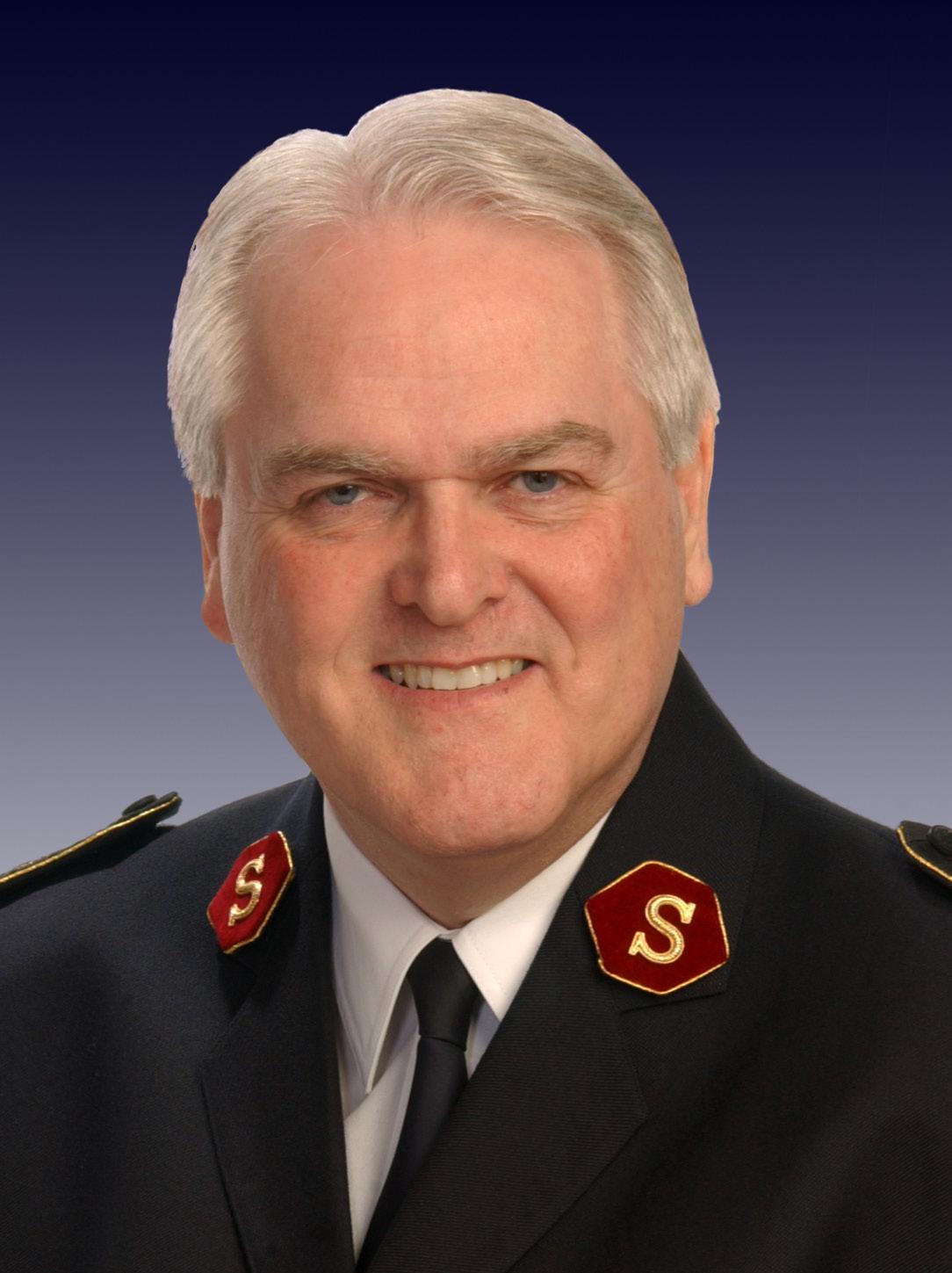
Former Territorial Commander of the then-New Zealand, Fiji and Tonga Territory, General Shaw Clifton (retired) was promoted to Glory from the Princess Royal University Hospital, Orpington, UK, on 29 May 2023. He served this territory from March 2002 until June 2004. In addition to his undoubtedly strong leadership qualities, General Shaw Clifton will be remembered for his clear, sharp mind, undergirded by a pastoral spirit of sensitivity and compassion which was appreciated and valued by those who knew him. He was also a man of considerable literary skill and a prolific writer. During his officership General Clifton served on the Salvation Army’s Doctrine Council and International Spiritual Life Commission. He was a founding member of the UKI Territory’s Moral and Social Issues Council and visiting lecturer at the International College for Officers from 1979 until well into retirement, lecturing also at the UK’s William Booth College.
For the full story, go to saltmagazine.org.nz
Greymouth Corps Celebrates Opening
The relocation of The Salvation Army in Greymouth has been many years in the making. With a recent history of change and uncertainty, things came to a head a few years back with a reconsideration of the land lease and an earthquake-prone building notice. In God’s perfect timing, late last year a freehold earthquake-strong building became available and their journey to relocate began. The corps (church) is now located in the oldest church building in Greymouth, originally opened in 1936 as a Baptist church, then latterly used as a funeral home. There is a designated worship space, office, foyer-lounge and community hall. Celebrations and the blessing took place recently and the corps are now happily ensconced in their new space. For the full story, go to saltmagazine.org.nz
Commitment to LongTime Pub Ministry
Two long-serving Christchurch Salvationists spent almost 90 years collectively serving in Salvation Army pub ministry before the pandemic brought their long volunteer run to an end in 2020. Allan Cleave (right), aged 88, joined pub ministry in 1965, while Frank Green, aged 67, started in 1986. Between them, they have 89 years’ experience of regularly visiting pubs, hotels and taverns in their areas, handing out War Cry magazine (recently renamed SALT: Salvation Army Life and Times) and collecting thousands of dollars in support of Salvation Army community services. They have also provided kind listening ears for pub patrons, praying with them and referring some to helping agencies.
For the full story, go to saltmagazine.org.nz
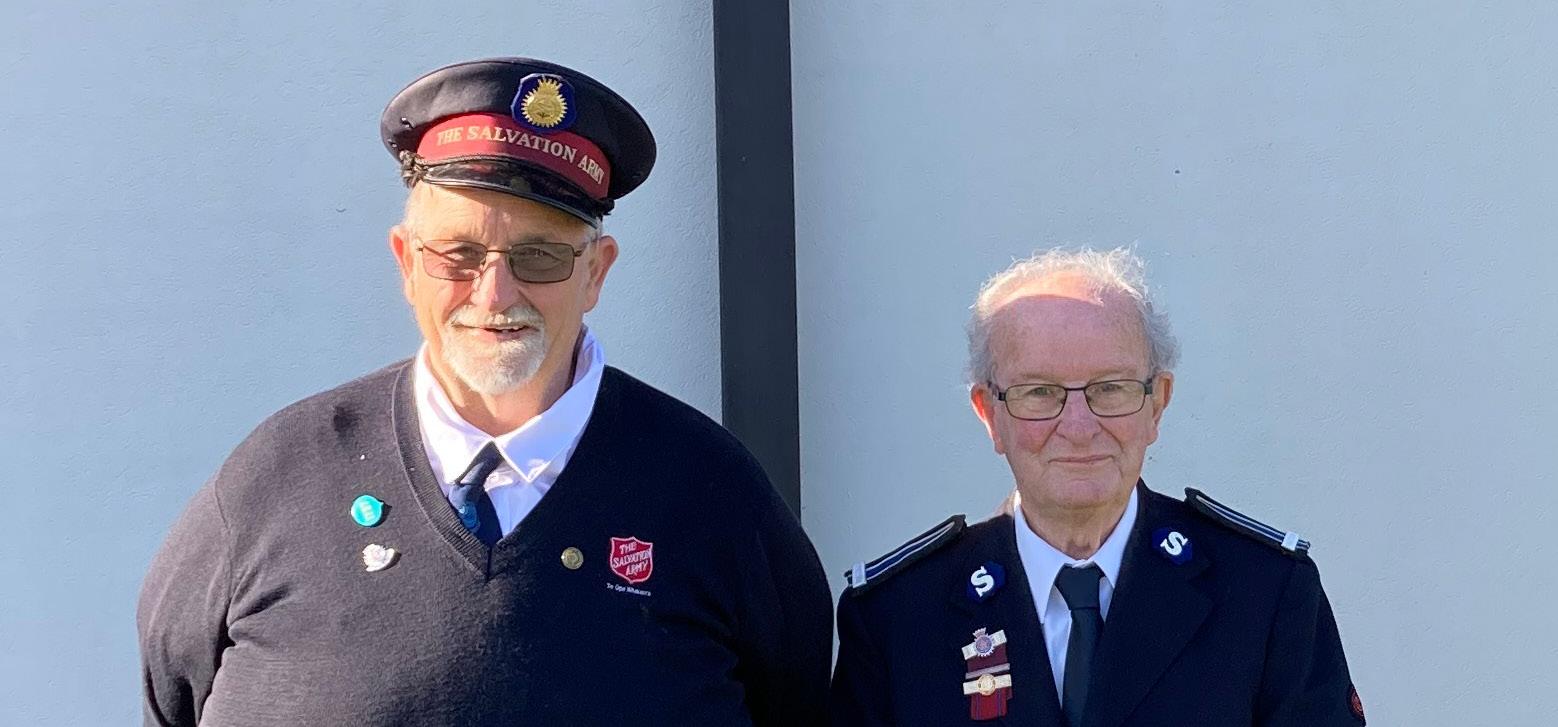
30 July 2023
Christchurch City Corps Celebrates 140 years

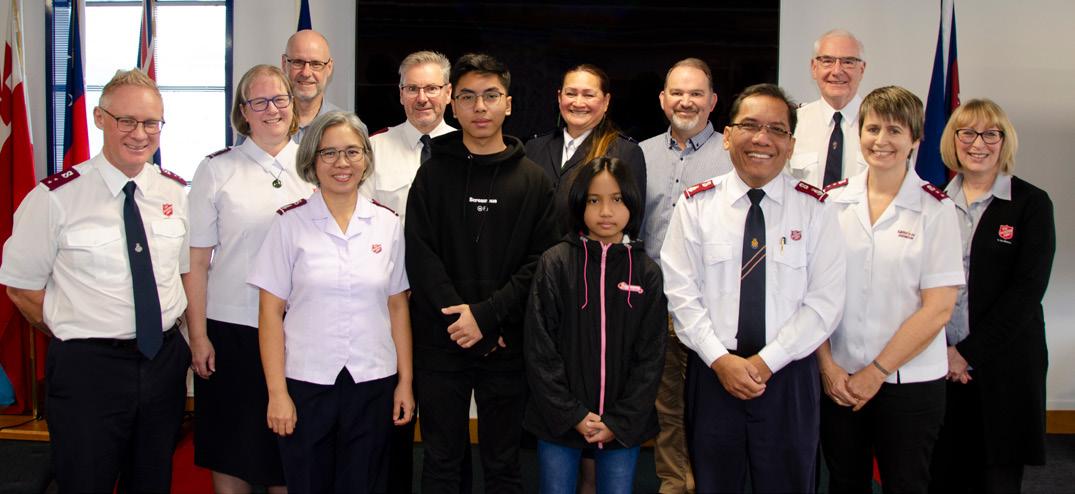
Salvationists past and present came together recently to mark 140 years of Christchurch City Corps (church). Up to 170 people took part in celebrations on Sunday 21 May, which included a morning service, afternoon concert featuring the corps brass band and songsters, and a dinner. Corps Officer Lieutenant Scott Noakes, says a number of former band members attended, with some re-joining the band for the concert. Scott says the celebration was an excellent opportunity to both honour the development of the corps and its people over the decades as well as to look ahead to the future.
For the full story, go to saltmagazine.org.nz
Fiji Child Sponsorship Projects Update

Child Sponsorship in Fiji reaches out to children and youth throughout the country with assistance in key areas including education, family care, development and evangelism. In December 2022, the project distributed more than 2000 primary and high school stationery starter kits. The kits included pencil cases, assorted stationery and exercise books. In addition, 90 school bags were distributed specifically through our Family Care Centres to children in need. A new part of this project started in January 2023, providing uniforms and sandals to more than 430 primary and high school students. The Salvation Army’s network of corps, outposts and Family Care Centres helped the Set For Schools projects to identify the most inneed children and youth in local communities.
For the full story, go to saltmagazine.org.nz
Territorial Welcome for Indonesian Officers
A warm welcome morning tea was held on a chilly morning at Territorial Headquarters in Wellington to welcome LtColonels Alberth and Elsi Sarimin, officers from the Indonesia Territory, who are appointed to serve in the New Zealand, Fiji, Tonga and Samoa Territory. Lt-Colonel Alberth Sarimin is appointed to the role of assistant chief secretary, while Lt-Colonel Elsi Sarimin takes up the appointment of assistant territorial secretary for Personnel (Resources). Two of the Sarimins’ school-aged children have come with them to New Zealand, with their eldest staying at home in Indonesia.
For the full story, go to saltmagazine.org.nz
saltmagazine.org.nz 31
Official Engagements
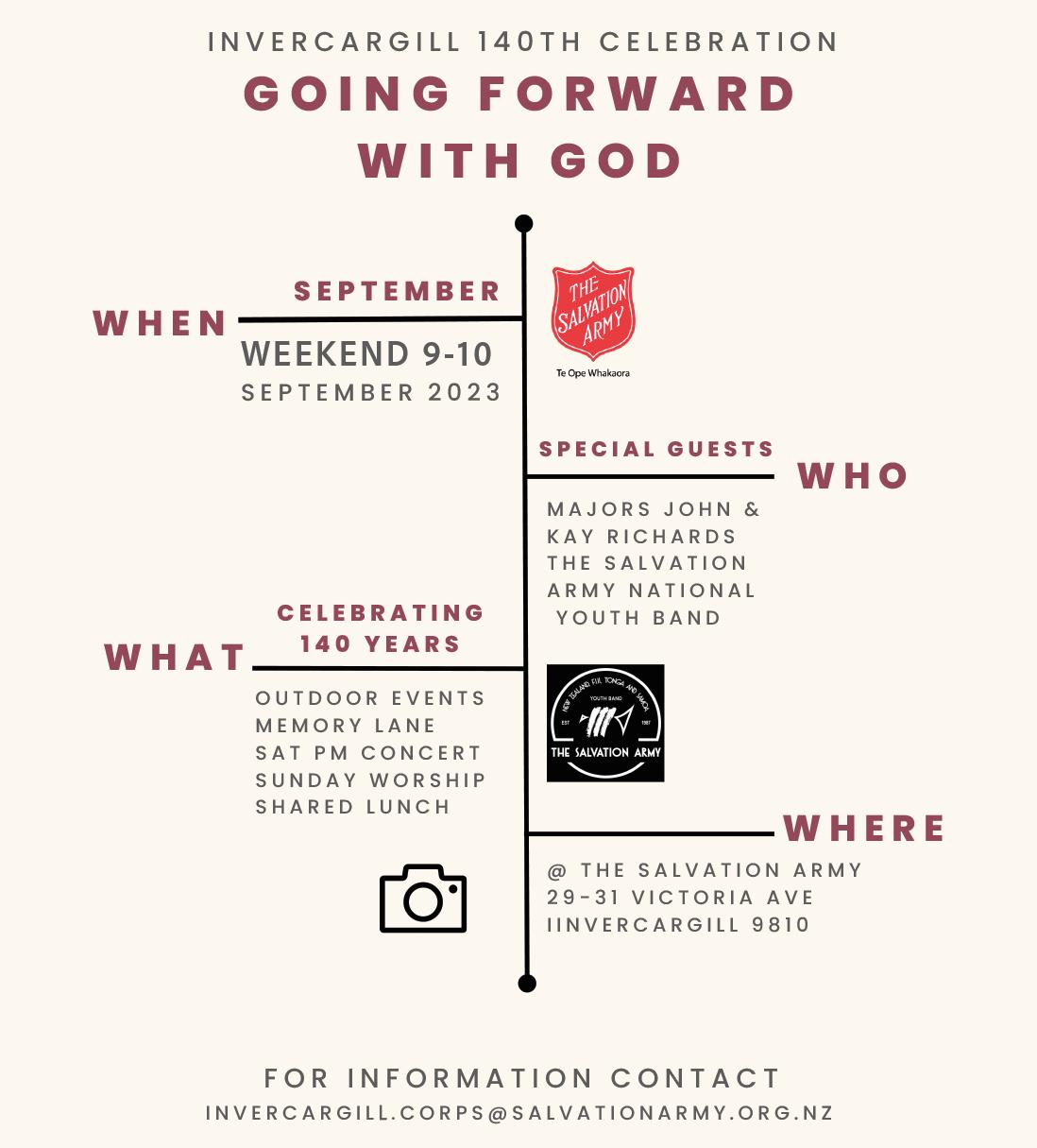
Commissioners Mark (Territorial Commander) and Julie Campbell (Territorial President of Women’s Ministries)
3–5 July: Territorial Appointments Conference
6 July: Territorial Executive Council
20–24 July: Territorial Leaders’ visit to Samoa
25–31 July: Territorial Leaders’ visit to Fiji
Colonel Gerry Walker (Chief Secretary)
3–5 July: Territorial Appointments Conference
6 July: Territorial Executive Council
18 July: ASARS National Conference
24–25 July: Strategic Awareness visit, Central Division
Major Liz Gainsford (Territorial Secretary for Spiritual Life Development)
3–5 July: Territorial Appointments Conference
6 July: Territorial Executive Council
10–11 July: Spiritual Life Network Gathering
Gazette Summary
To read the full version of Gazette notices, visit saltmagazine.org.nz/gazette
Additional appointment: Effective immediately, Auxiliary Captain Ian Wells has been appointed as Auckland/Northland Areas Emergency Services Coordinator as an additional appointment.
Bereavement: Margaret Moffatt, the mother of Captain Andrew Moffatt, passed away on 6 June 2023, from Nelson. We ask you to uphold Captains Andrew and Rochelle Moffatt and their extended family in your prayers during this time of grief and loss.
Colin Dale, the father of Lieutenant Blair Dale, passed away on 18 May 2023, from Auckland, aged 73. We ask you to uphold Lieutenants Blair and Lashana Dale and their extended family in your prayers during this time of grief and loss.
Births: Lieutenant Alanah Moody has given birth to a baby boy, Chase David Moody. Chase was born on Saturday 20 May 2023, weighing 8lb 15oz (3.696kgs). May God bless Lieutenants Alanah and Chris Moody and big sister Blake as they welcome Chase into their family.
Lieutenant Emma Frunt has given birth to a baby girl, Margot Bronny Frunt. Margot was born on Wednesday 17 May 2023, weighing 8lb 7oz (3.975kgs). May God bless Lieutenant Emma Frunt and husband Jaden Frunt as they welcome Margot into their family.
Sat 19–Sun 20 August
Upper Hutt Home League
Save the Date 90th Birthday
with special guest Major Alison Moody
2pm Saturday 19 August
Rob Innes Musical Entertainer
10:30am Sunday 20 August
Service of Thanksgiving (Home League Sunday)
RSVP by 10 August
Call 04 528 6745
Quiz Answers: 1. John Spilsbury, 2. Greywacke, 3. June 8, 4. Three, 5. 31 December 1869.
32 July 2023
SALVATIONISTS IN HISTORY
The History of Self Denial
The Salvation Army has a rich and varied past which is preserved at the Heritage Centre and Archives (Plowman Resource Centre, Upper Hutt). This edition of Salvationists in History looks at the origins of the Self Denial Appeal, previously known as One Week’s Salary on Missionary Service (OWSOMS).
The Salvation Army is widely recognised for its community outreach, both locally and on an international scale. The Self Denial Appeal perfectly encapsulates this for the Army. The appeal was initially proposed in England in 1886 by General William Booth. Cyril R Bradwell reports in his Salvation Army history Fight the Good Fight , that ‘a British officer, Major (later Commissioner) John Carleton offered to go without his pudding for a year and donate the money saved to Army funds’.

While the idea of giving up something for a year was rejected, Booth suggested instead that one week should be set aside for Salvationists to deny themselves something and have the funds go towards the work of the Army. That first year of the Self Denial week, held just in the United Kingdom, raised nearly £5000—an impressive feat at the time!
This yearly commitment later became known as the Self Denial Appeal, and the funds raised during the appeal were used both for overseas missionary work and for local social and community work of the Army.
The Self Denial Appeal operates each year in all of The Salvation Army’s 130 territories. A specific challenge arose for officers and Salvationists alike to commit to donate One Week’s Salary On Missionary Service.
Issues of The War Cry over the 1890s and early 1900s reported contests between corps officers and Salvationists and individuals as they strived to raise funds for overseas mission. One standout supporter of the Self Denial Appeal was Tommy Gibbs, a chimney sweep who would annually throw out an open
challenge for any other collector to raise more money for the Self Denial Appeal than him. His challenge was accepted by Mrs Adjutant Hollins in 1901, who raised £80 to Tommy’s £60, and forced him to admit defeat.
A great opportunity that arose from the Self Denial Appeal was the ability to make use of the Army’s talented musicians. The original October season for the appeal allowed for bands and singing groups to tour during the springtime, giving more rural towns the enjoyment of public entertainment during the appeal.
Although other fundraising appeals have since sprung up in the Army, the Self Denial Appeal, along with its challenge of donating One Week’s Salary On Missionary Service, still remains an important pillar of the overseas mission for the territory and across the international Army.
For New Zealand, Fiji, Tonga and Samoa Territory, each year’s appeal centres around a small number of other territories and their outreach programmes. This year’s Self Denial Appeal focuses on the Kenya and Papua New Guinea Territories, sharing stories of people supported by programmes that the appeal will help fund—putting faces to the missional work of the appeal.
saltmagazine.org.nz 33
Encouraging Empathy

Empathy and compassion are vital skills for children to develop, especially as they encounter and interact with more people outside of their immediate family. Empathy can help to improve their social skills, as well as growing teamwork and generosity. We have the privilege of being part of a diverse territory in The Salvation Army, including four different countries and people from all walks of life in our churches. This gives us great opportunities to teach our children more about the world.
A good way to help your children develop empathy for other people is by encouraging them to be curious about others and the world around them. The more they understand about people and situations that are unfamiliar to them, the more they are able to have compassion for their unique struggles and see things from their perspective. It is important that children are encouraged to ask questions, and that parents can feel ready and equipped to answer them with that same curiosity. In turn, ask them questions to get them thinking about what is piquing their curiosity.
Sometimes kids might ask questions or make observations that we might find a bit uncomfortable. Children are good at noticing things and will often point out similarities or differences with other people: the kids in their classes, their neighbours, their friends from church. If these observations are around race or culture, it gives us a great opportunity to highlight the commonalities but also provoke curiosity of the differences. It is important to encourage their natural curiosity, as well as reminding them that the things that they might see as differences, like hair colour, or skin colour or culture, aren’t better or worse than their own. Explain to them that differences in people and cultural heritage are what make the world more beautiful and exciting, and they give us opportunities to share with and learn from each other.
Let’s learn more about the work that The Salvation Army does in countries like Kenya and Papua New Guinea, and how we can help support them.


Here are some photos from these countries.
• What do you think you have in common with these kids?
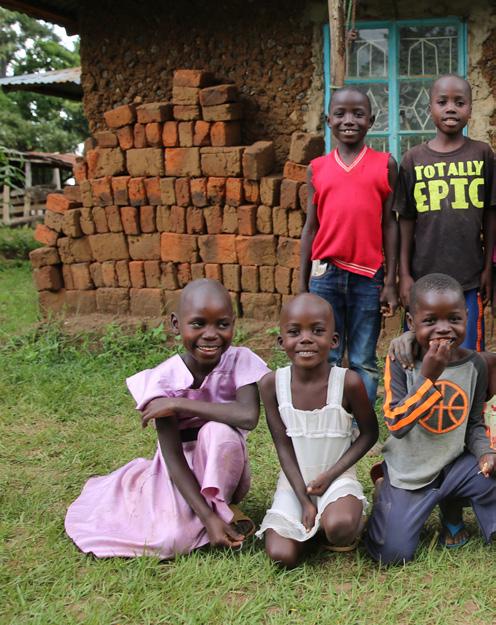
• What games do you think these children like playing? Do you think you have the same favourite games?
• How is your classroom different from this classroom in Papua New Guinea?
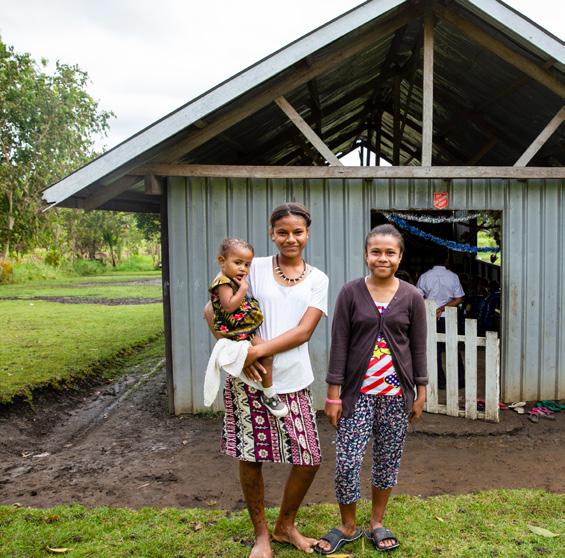
• What would you want to share with these kids?
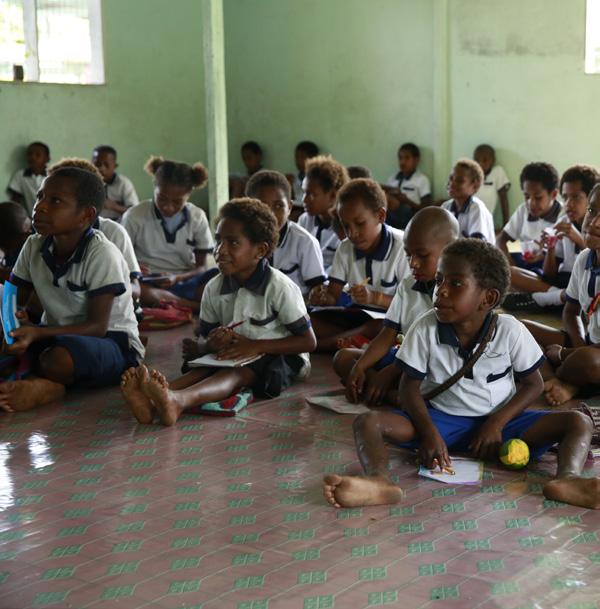
The Salvation Army’s work in Kenya Papua New Guinea
and
Kenya free School is in Kenya.
People in Kenya drive on the of the road, just like us! 34 July 2023
left side
third largest
Papua New Guinea has the rainforest in the world.


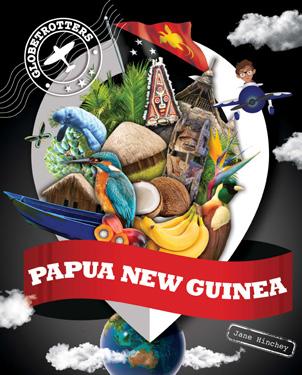
Curious is Cool
When they did not find him, they went back to Jerusalem to look for him ... they found him in the temple courts, sitting among the teachers, listening to them and asking them questions. Luke 2:45–46
Read: When Jesus was a child, his parents lost him in Jerusalem and found him sitting at the temple, asking the people there lots of questions. He was curious and wanted to learn about the world around him, so he spent time asking questions and listening to the answers he was given.

Keen to
Learn More?
Think: It is awesome when we are curious and ask questions to find out more about how other people live. When we ask and listen, we can learn a lot about other people and places, and we can discover that both the things that are similar and the things that are different make us special.
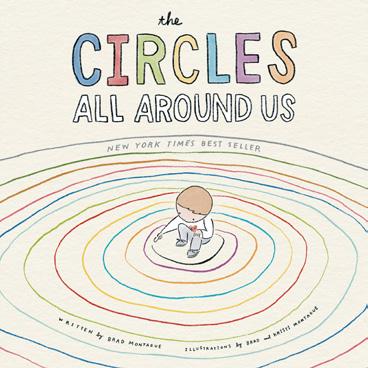
Pray: Ask Jesus to give you lots of questions so that you can learn about how different people from across the world live. Tell him that you want to be curious, and that you want to learn how to love other people and work with them to make a beautiful and loving world. Thank him for all the many different people on the planet and pray that Jesus will be with all of them.
Do: Ask lots of questions! Ask your parents, ask your friends, ask your teachers! Then listen to the answers. As you learn about different people and places, like Kenya and Papua New Guinea, ask how you can team up with people who live there to make the world a more loving and caring place.
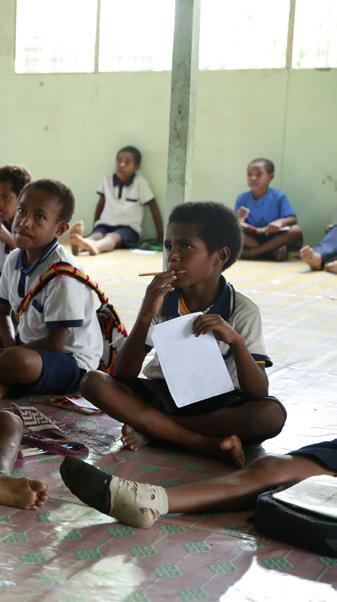
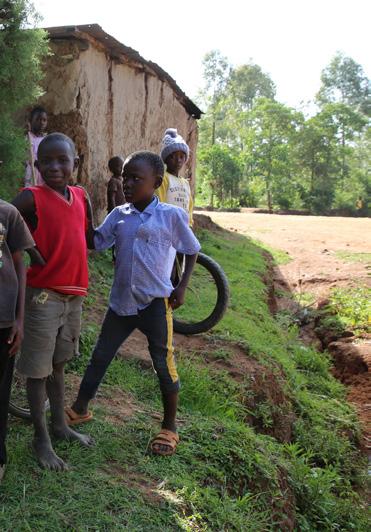


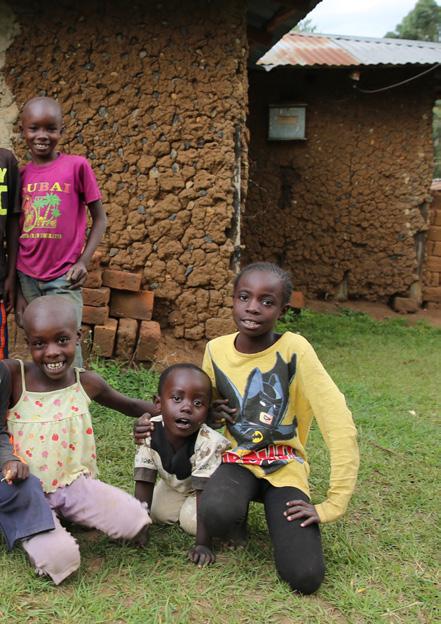
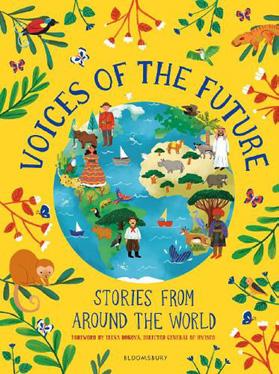
Check out these books!
Papua New Guinea
saltmagazine.org.nz 35
It doesn’t matter how much you have.

What matters is how much you are willing to give from what you have.
2 Corinthians 8:12 (cev)















 Mad Honey
Novel | Jodi Picoult and Jennifer Finney Boylan
Mad Honey
Novel | Jodi Picoult and Jennifer Finney Boylan


 Source: Please Don’t Pray With Your Mouth Full , by Bob Swanson.
Source: Please Don’t Pray With Your Mouth Full , by Bob Swanson.














 WORDS Kelly Cooper | ART Sam Coates
WORDS Kelly Cooper | ART Sam Coates









































